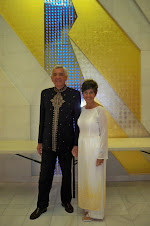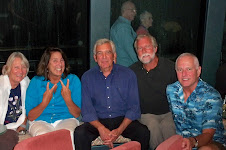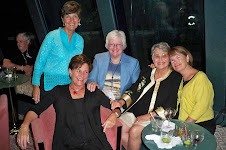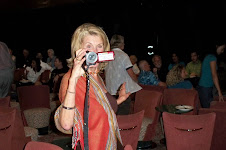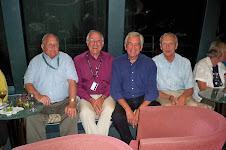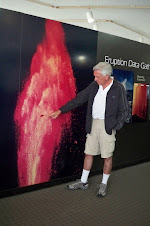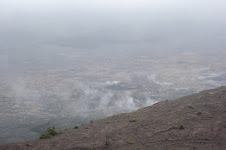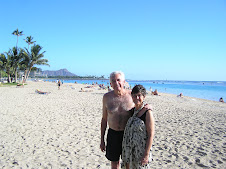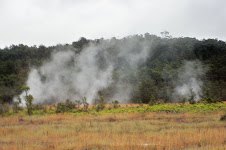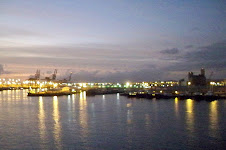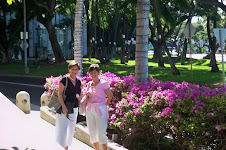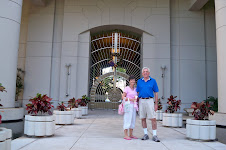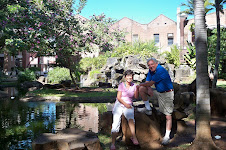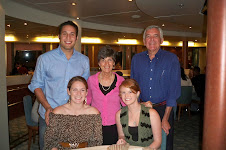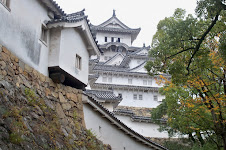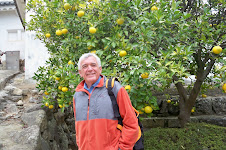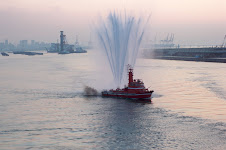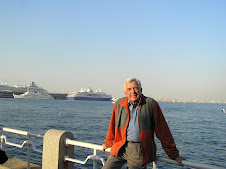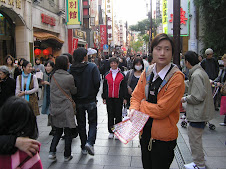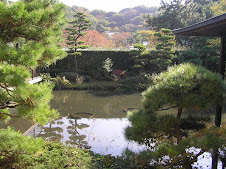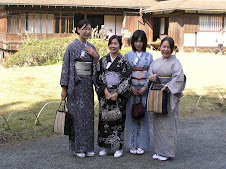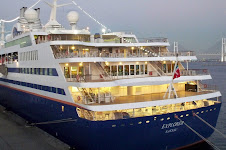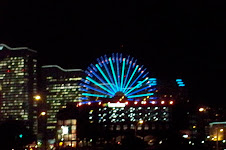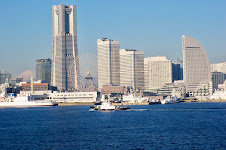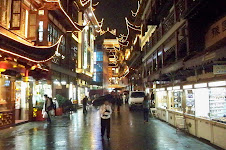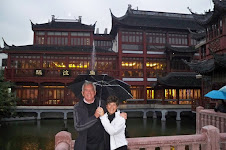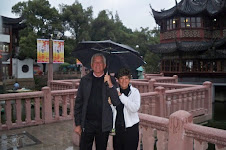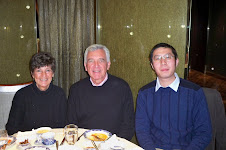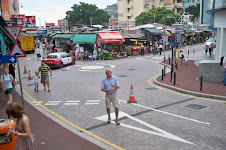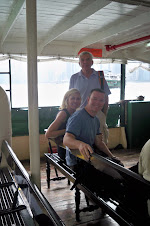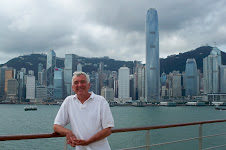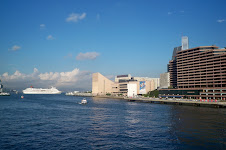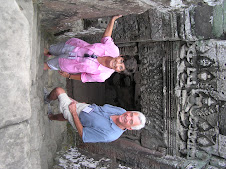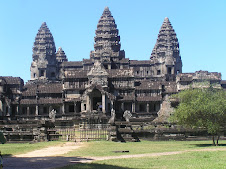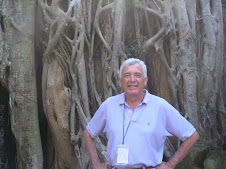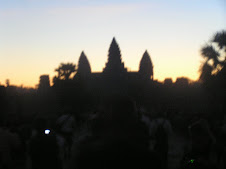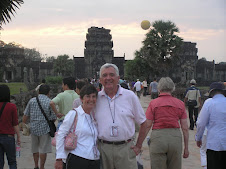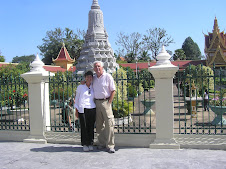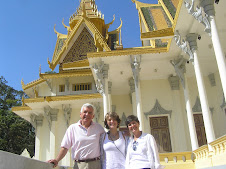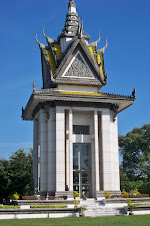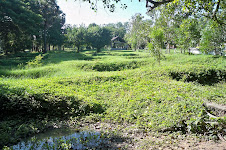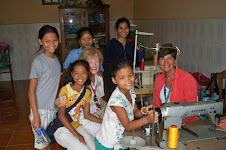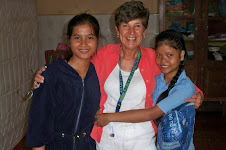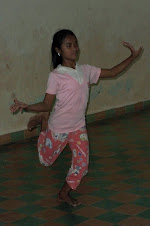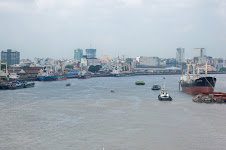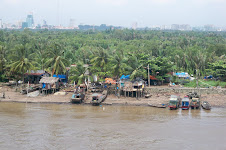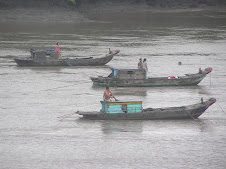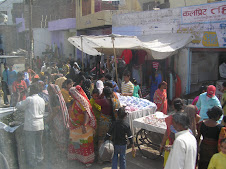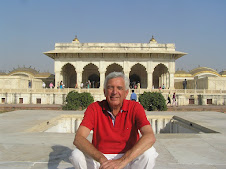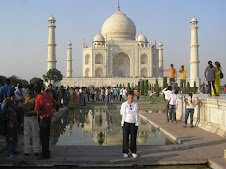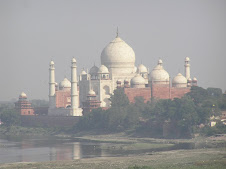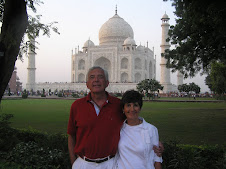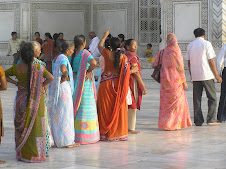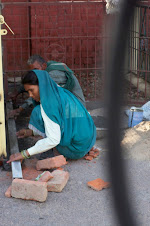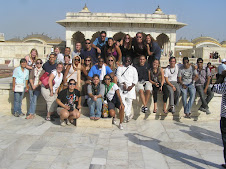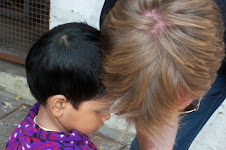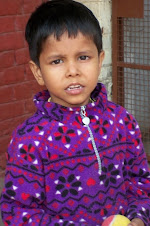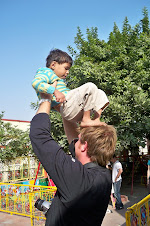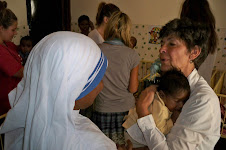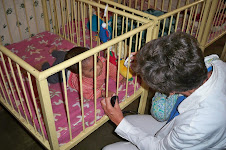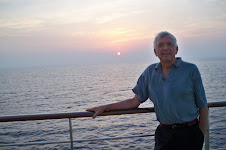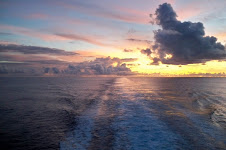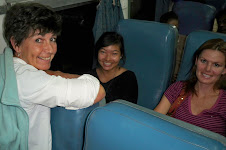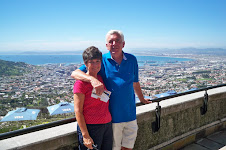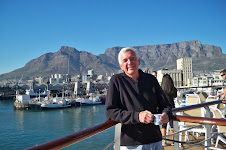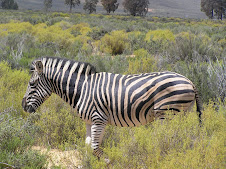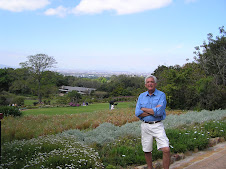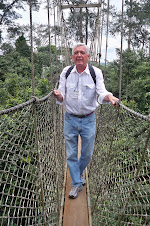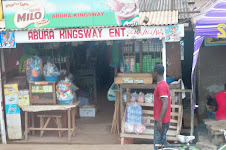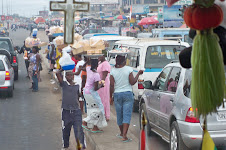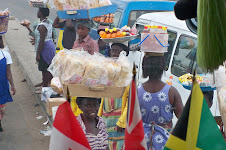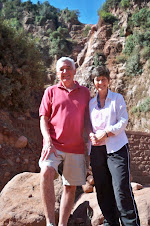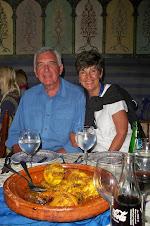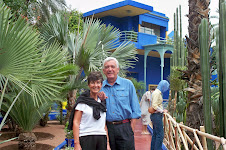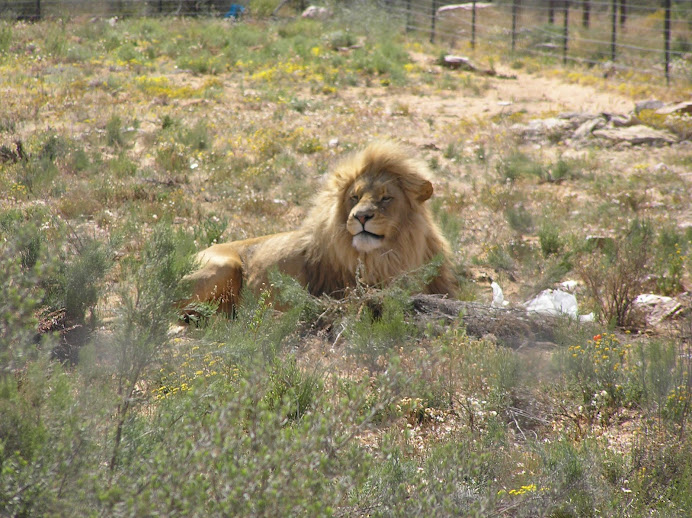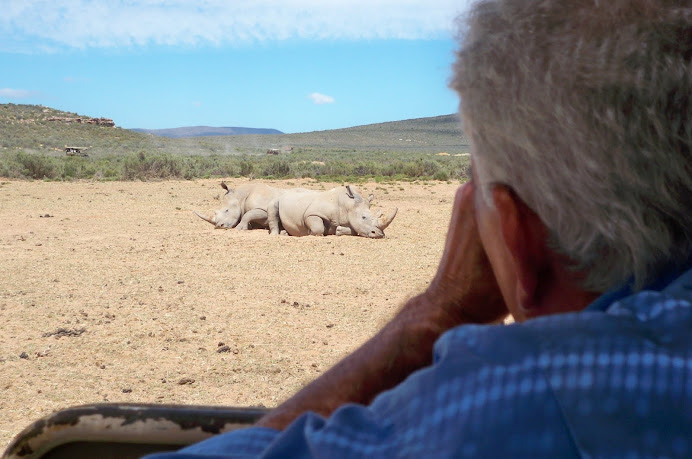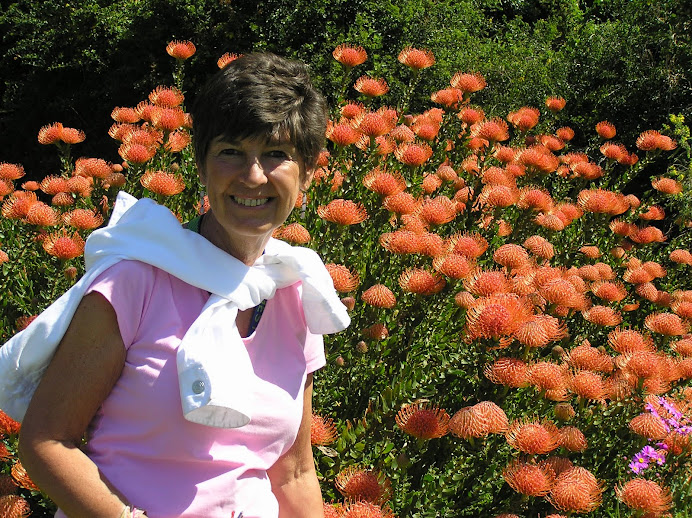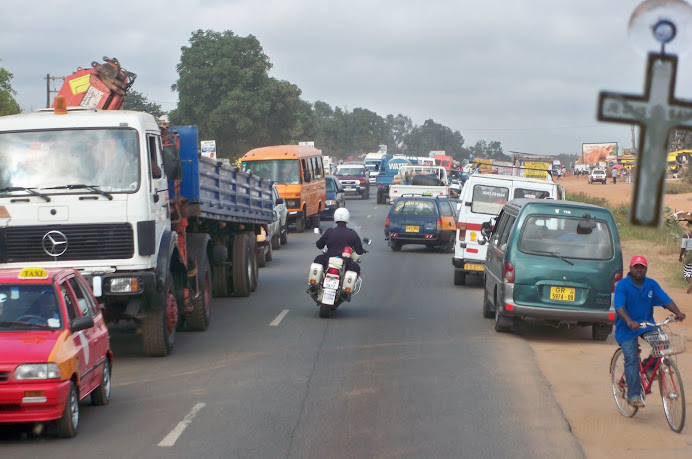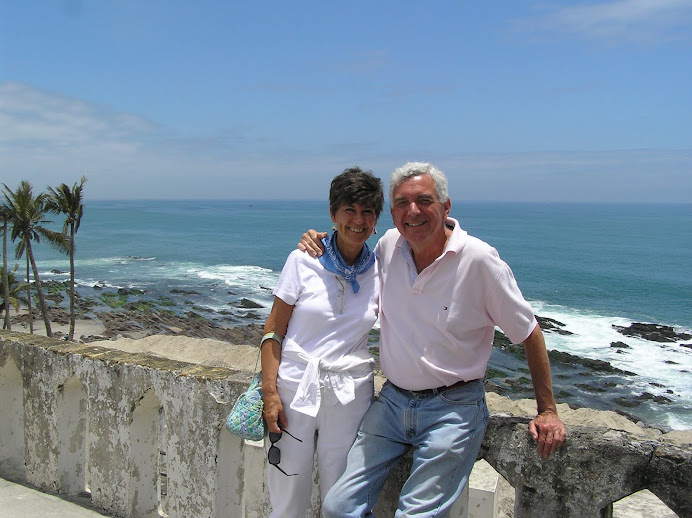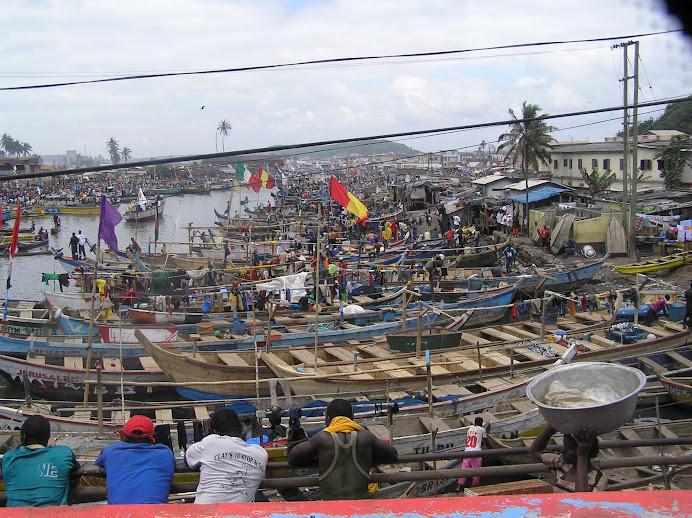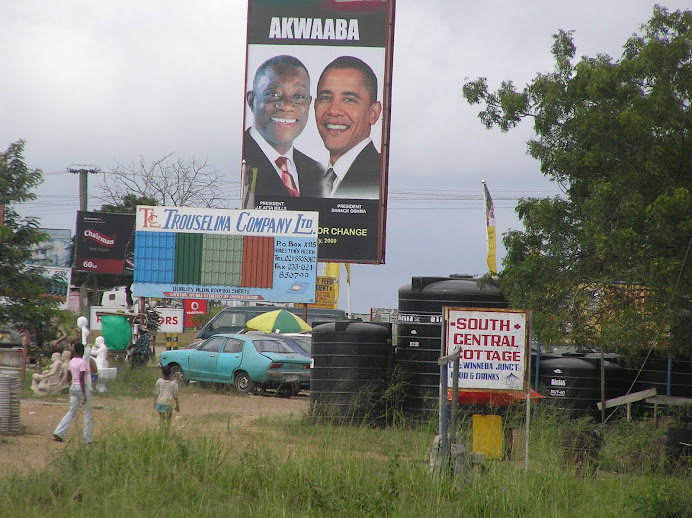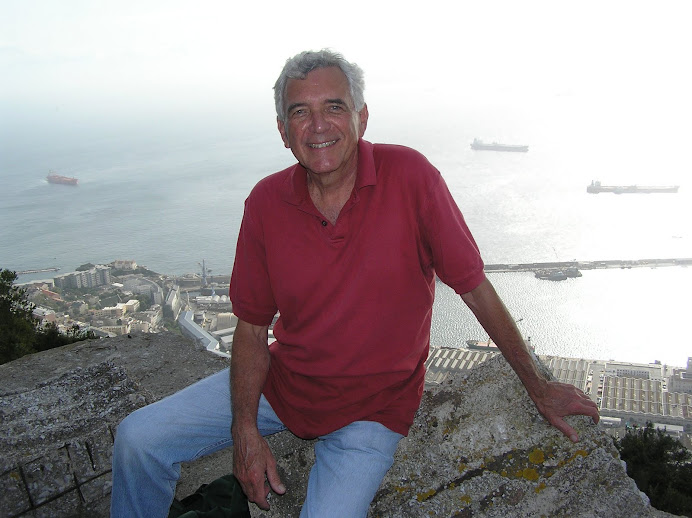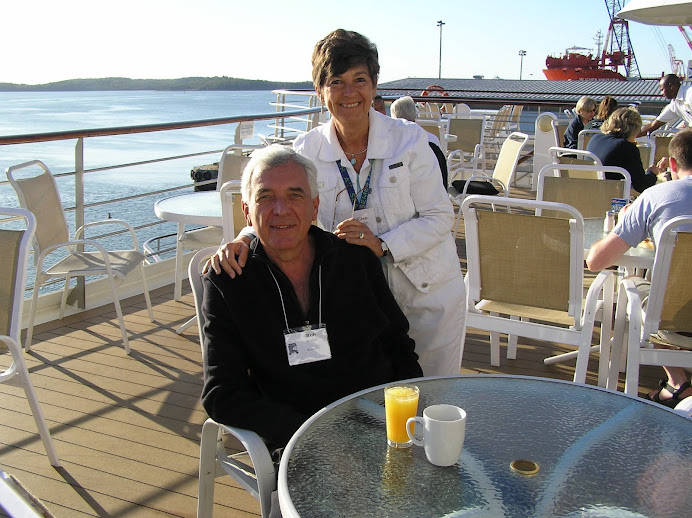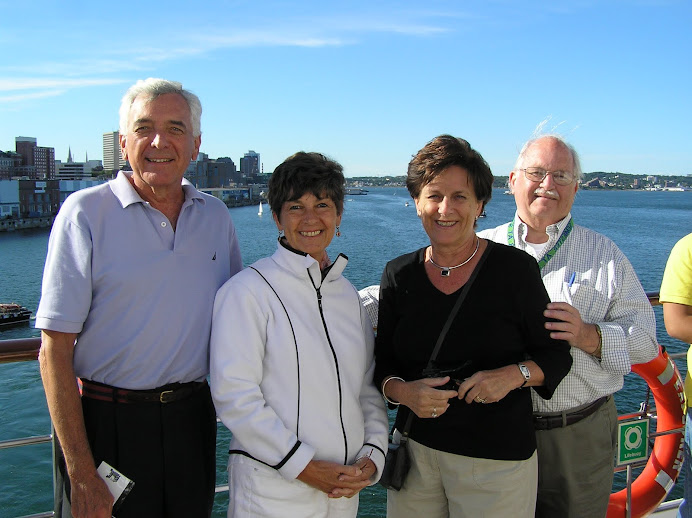Words are inadequate for me to describe how glad I am that I got to on the Semester at Sea Voyage.
I was always very busy with classes, pictures, mothering college students, the blog, new friends, fascinating new ports... Never once was I bored; but then, I have never, ever been bored.
None of us on the ship felt that we were on a "a cruise" or a "vacation". We were all learning about the places we visited, the history, geography, geology, languages, culture...We were involved in service projects. I loved working in one of Mother Teresa's orphanages, and another in Cambodia, talking with local people, hearing their stories, and their ancestor's stories. And then there are the markets...I had a ball in markets. I got a little addicted to markets. We paid full price without exception in the Townships near Cape Town where the grinding poverty is apparent every where we looked. In Shanghai, we bargained our heads off and actually gained the respect of the vendors by doing so. They would often grin and shake our hands at the end of negotiations.
Traveling on the MV Explorer put us in a warm, genial society of interesting and intelligent, not to mention well-educated(every professor had to have a terminal degree--mostly Ph.D.s), people. We grew to love one another. I will miss the mealtime conversations that went on far beyond the meal, the classes in which I learned from the world-class professors, and also learned from watching the students learn, and from seeing them grow intellectually. Much of what Rob and have lived through isn't even on the college students' radar as history. They thought we "won" the Viet Nam War. Many thought racism never was much of an issue in the South. Some had never heard of Pol Pot or even Ho Chi Minh, or Mao. By the end, we all knew more. The ports are where we went inland and saw that Man keeps making the same mistakes over and over, that slavery is inexcusable and still going on, that we are using up our resources, ruining our land and seas, that people are as alike as they are different, that great beauty and great kindness still exist along side evidence of man's inhumanity to man...
We came home to the snow storm of the century here in Charlottesville. I am glad we didn't miss it. Our next-door-neighbors, Doug and Allison Woodside, had an impromptu wine and hor s d' oeuvre party and we were all to bring what snack we had to share. Doug and Allison have frequently had spur of the moment neighborhood snow parties to which we all bring what we can find at home to share.The event was a wonderful reminder that our warm an careing ship community is much like the one we left in our very own neighborhood. I still miss the ship and our friends there, but at least I am not blind to the fact that I am part of other communities that are just as warm and careing.
While we were gone I sent my recently widowed Mother a play-by-play report on the trip by sending her letters after every port (15 of them)via e-mail to daughter Hailey who printed each letter as it arrived and mailed it to Mother (who is as computer phobic as a person can be). Then Mother mailed the letters on to her sister Harriet, one-by-one. They enjoyed visiting on the phone about them. Some of those letters are incorporated in this blog. I also sent a packet of photos via Kodak Easy Share to Mother after every port so she could see as well as read about our adventures each country.
Now I am thinking about going through letters to Mother, e-mail messages I sent from the ship, and this blog to put together a much more polished and complete report of our trip around the world on the MV Explorer. I want to tell the stories of some of the people on the ship, such as Milton, who has adopted a school in Ghana, and not only has he had it fixed up with carpentry and paint, and mailed back school supplies, but he has also inspired the students in Rob's non-profit leadership course to set up an actual foundation to support this and other schools in Ghana. As part of their exam, the students set up a very impressive website for Milton's school foundation and a first rate promotional video. They contributed their own money and raised funds for the new foundation. Milton got very sick on the trip with severe intestinal pain and was hospitalized in(I think) India. The condition got worse and Milton had to fly back from Japan to be treated at home. He was very sad to leave. At his last event on board before he had to go off the ship, Milton was cheered, aplauded, and given a standing ovation by the students and by the rest of the ship community. I knew Milton, and about Milton's work with the Ghanan School, but I had no idea that so many others did. He was a very quite hero.
- From Ellen
- Rob and I are going around the world on the 100th voyage of Semester at Sea. We board our ship, the MV Explorer, a floating college campus, in Norfolk, VA on August 24 with the rest of the 30 faculty members and their families. We arrive in our first port, Hallifax, Novia Scotia, on August 27 where 650 college students from 250 colleges and universities come on board to begin their Semester at Sea, for which they earn credit toward their bachelors degrees. When you are on the Interactive map, you can click on each port to see when we are there and see information about each port.
Sunday, December 20, 2009
Thursday, December 10, 2009
Storm at Sea
Guess what--we are back in Honolulu!!! We are all elated. There is a big storm in the Pacific between us and San Diego--so the powers that be, mainly Captain Jeremy and the Deans, decided not to run us into the storm, which the Internet has already told us has swells of 60 to 80 feet high, (Captain Jeremy's decision). The reason we couldn't stay in Hilo, where we had just spent two days in the rain, is that there is only one berth in the harbor for a ship such as ours. The ship that has the berth next was already in the harbor waiting for us to pull out so that they could dock. The only tourist attractions in Hilo are the Walmart and Hilo Hatties. We had all been out in the center of the island to see the volcanos in the rain and vog. We were ready to leave, especially for our favorite sunny Honolulu!
We spent another two days in Honolulu and are now in realitively calm seas headed for our final destination, the port at san Diego.
Captain Jeremy say we are the fastest ship in the oceans and we will arrive right on schedule just by cranking up the speed. I will say we are skimming right along!
We spent another two days in Honolulu and are now in realitively calm seas headed for our final destination, the port at san Diego.
Captain Jeremy say we are the fastest ship in the oceans and we will arrive right on schedule just by cranking up the speed. I will say we are skimming right along!
Monday, November 30, 2009
Japan
Today is Thanksgiving Day on the ship. We are having a specialThanksgiving Dinner tonight, and everyone is looking forward to it.
Japan was our last foreign port, next stop Hawaii. Hawaii will be a perfect port for us--they all speak English, take American money, have beautiful scenery, no malaria, no rabidmonkeys, safe food and water, drive on the right side of the road, have a warm climate, and are friendly to Americans...What more couldwe ask? An Anthropologist on the ship actually complained that we aregoing to Hawaii because it is too ordinary. If Hawaii is ordinary, I have a very high tolerance for ordinary. I can't wait.
We cross the International Dateline on Saturday, so have 2 November28s in a row. We have been moving the clocks forward, an hour a night here and there, to keep up with local time, thus losing an hour's sleep each time. Saturday we get all that time back all at once. Going around the world the other way would have given us extra hours and more sleep. Then, I guess, we would lose a day at the InternationalDate Line. I would be happy to lose a day to gain sleep--so next timeI believe I will go around the world the other way.
Japan surprised me. I hadn't realized that I had so much bias against the Japanese in my head from all of the World War II stories about how badly the Japanese treated our troops. Unknowingly, I expected to see an enemy. What I saw was very gracious, friendly, helpful, honorable (no one even jaywalks), individuals, most of whom weren't even born in time for WW II. If any of us even looked puzzled, a Japanese person would immediately try to help us, even though he or she most likely did not speak English. One student said she and a few students were on the street, trying to figure out how to get to a particular place. Two Japanese students, who spoke no English, came up to offer help. Our girls showed them the place on the map where they wanted to go. The Japanese girls led them there--a 20 minute walk in the opposite direction from where the Japanese girls had been headed. We all havesimilar stories.
The streets are immaculate, yet have no trash cans. They literally generate no trash. I put what little I had in my purse to throw awayon the ship.The trains are immaculate, too, and run precisely on time, and go anywhere you want to go. Just as in China, no one hassled us to buy anything--a good thing because we couldn't afford much. Prices arejust as high as we had heard. Most people we know who had been to Japan said the prices actually had not risen, so perhaps that was a sign that the World Wide recession has reached here. Another sign ,according to friends who had lived in Japan, were the neat boxes with tarps over them under some bridges where a few homeless people had setup residence. Neatly lined up outside the box were their little Japanese shoes. Contrast this picture with the large shanty towns in Ghana, South Africa, and India, where dirt and trash were strewn all over the place, and anything left outside would be stolen immediately.
The Japanese people are all gentle, neat, and honest to the core. We were told before we arrived that in Japan no one would pickour pockets, try to rob us of anything, take advantage of us in any way, and would always be helpful. We were told never to take a taxi because, even though they have meters and what you see is what you are charged, the price is too high--a $100 or $150 for a cab ride right in the same town, but to take the trains where you could go anywhere quickly in town for about 65 cents.
On our second day in Kobe, Japan, we went with our friend and Asian expert on the ship, James Godfrey, and 7 other ship friends, to thetown of Hamidge (don't hold me to that spelling--I am sure it is wrong) by train from Kobe. We got there in about an hour and then walked close to a mile through town to the Hamidge Castle, built for a powerful War Lord in 1650. The place was huge and beautiful and white. I walked up and up with everyone until I finally gave out and waited on a bench while our group walked up the last steep steps way up to the tallest tower. Picture walking up a tall lighthouse on steps 2 feet steep and only 4 inches deep.Those Samurai soldiers guarding the fort were some very strong fellows even if just from going up and down all the steps all the time.While I waited at the bottom, a group of middle aged Japanese tourists arrived back down from the tower and headed for my bench. I moved over to makeroom for two very tired women. The man with them pulled out some chocolate candy for the women and gave me some too.Caffeine and sugar--just the thing I needed! We had lunch in the town and looked in a few shops before taking the train back to Kobe and our ship. Rob and I walked back to the shipwith James, our leader. We stopped at a Baskin-Robbins where Rob got ice-cream cones for James and himself and spent the very last of our Japanese yen. I didn't want ice-cream; I got a coca-cola--caffeine and sugar, remember. R
Rob prides himself on leaving every port with only the coins he is taking back for grandsons. In Mauritius, the extra money would have been useless because no place else in the world accepts or exchanges Mauritian dollars.
Rob and I also had a good time in Yokohama, a city of about 7 million on the coast south of Kobe. We went to a botanical garden inYokohama which was very nice. We went on this particular outing with two other couples from the ship, one of whom, Sandra and Colin White had lived in Japan for five months. We all took a city bus there and back and wound up in China Town for lunch. Then we went our separate ways, doing as we pleased as we walked back to the ship from ChinaTown. We wound up in a lovely park beside the harbor where we took pictures of our ship.
Now it is our second November 28 and we have a big fund-raisingauction for Semester at Sea --scholarships and such. A an off-seasonweek at our beach house is our donation to the cause. Lots of vacationhomes are among the items up for bids, places ranging from Lake Tahoe, several in Colorado, a week in a luxury Paris mansion complete with a chef and maid--air fare is included, a week in a house in a village in the Check Republic. I hear that one year a student paid $3,000 for the Captain's hat. My favorite is bedtime stories read by Dr. Dave. We have children on the ship, but I bet a student gets it--everyone likes Dr. Dave.
Japan was our last foreign port, next stop Hawaii. Hawaii will be a perfect port for us--they all speak English, take American money, have beautiful scenery, no malaria, no rabidmonkeys, safe food and water, drive on the right side of the road, have a warm climate, and are friendly to Americans...What more couldwe ask? An Anthropologist on the ship actually complained that we aregoing to Hawaii because it is too ordinary. If Hawaii is ordinary, I have a very high tolerance for ordinary. I can't wait.
We cross the International Dateline on Saturday, so have 2 November28s in a row. We have been moving the clocks forward, an hour a night here and there, to keep up with local time, thus losing an hour's sleep each time. Saturday we get all that time back all at once. Going around the world the other way would have given us extra hours and more sleep. Then, I guess, we would lose a day at the InternationalDate Line. I would be happy to lose a day to gain sleep--so next timeI believe I will go around the world the other way.
Japan surprised me. I hadn't realized that I had so much bias against the Japanese in my head from all of the World War II stories about how badly the Japanese treated our troops. Unknowingly, I expected to see an enemy. What I saw was very gracious, friendly, helpful, honorable (no one even jaywalks), individuals, most of whom weren't even born in time for WW II. If any of us even looked puzzled, a Japanese person would immediately try to help us, even though he or she most likely did not speak English. One student said she and a few students were on the street, trying to figure out how to get to a particular place. Two Japanese students, who spoke no English, came up to offer help. Our girls showed them the place on the map where they wanted to go. The Japanese girls led them there--a 20 minute walk in the opposite direction from where the Japanese girls had been headed. We all havesimilar stories.
The streets are immaculate, yet have no trash cans. They literally generate no trash. I put what little I had in my purse to throw awayon the ship.The trains are immaculate, too, and run precisely on time, and go anywhere you want to go. Just as in China, no one hassled us to buy anything--a good thing because we couldn't afford much. Prices arejust as high as we had heard. Most people we know who had been to Japan said the prices actually had not risen, so perhaps that was a sign that the World Wide recession has reached here. Another sign ,according to friends who had lived in Japan, were the neat boxes with tarps over them under some bridges where a few homeless people had setup residence. Neatly lined up outside the box were their little Japanese shoes. Contrast this picture with the large shanty towns in Ghana, South Africa, and India, where dirt and trash were strewn all over the place, and anything left outside would be stolen immediately.
The Japanese people are all gentle, neat, and honest to the core. We were told before we arrived that in Japan no one would pickour pockets, try to rob us of anything, take advantage of us in any way, and would always be helpful. We were told never to take a taxi because, even though they have meters and what you see is what you are charged, the price is too high--a $100 or $150 for a cab ride right in the same town, but to take the trains where you could go anywhere quickly in town for about 65 cents.
On our second day in Kobe, Japan, we went with our friend and Asian expert on the ship, James Godfrey, and 7 other ship friends, to thetown of Hamidge (don't hold me to that spelling--I am sure it is wrong) by train from Kobe. We got there in about an hour and then walked close to a mile through town to the Hamidge Castle, built for a powerful War Lord in 1650. The place was huge and beautiful and white. I walked up and up with everyone until I finally gave out and waited on a bench while our group walked up the last steep steps way up to the tallest tower. Picture walking up a tall lighthouse on steps 2 feet steep and only 4 inches deep.Those Samurai soldiers guarding the fort were some very strong fellows even if just from going up and down all the steps all the time.While I waited at the bottom, a group of middle aged Japanese tourists arrived back down from the tower and headed for my bench. I moved over to makeroom for two very tired women. The man with them pulled out some chocolate candy for the women and gave me some too.Caffeine and sugar--just the thing I needed! We had lunch in the town and looked in a few shops before taking the train back to Kobe and our ship. Rob and I walked back to the shipwith James, our leader. We stopped at a Baskin-Robbins where Rob got ice-cream cones for James and himself and spent the very last of our Japanese yen. I didn't want ice-cream; I got a coca-cola--caffeine and sugar, remember. R
Rob prides himself on leaving every port with only the coins he is taking back for grandsons. In Mauritius, the extra money would have been useless because no place else in the world accepts or exchanges Mauritian dollars.
Rob and I also had a good time in Yokohama, a city of about 7 million on the coast south of Kobe. We went to a botanical garden inYokohama which was very nice. We went on this particular outing with two other couples from the ship, one of whom, Sandra and Colin White had lived in Japan for five months. We all took a city bus there and back and wound up in China Town for lunch. Then we went our separate ways, doing as we pleased as we walked back to the ship from ChinaTown. We wound up in a lovely park beside the harbor where we took pictures of our ship.
Now it is our second November 28 and we have a big fund-raisingauction for Semester at Sea --scholarships and such. A an off-seasonweek at our beach house is our donation to the cause. Lots of vacationhomes are among the items up for bids, places ranging from Lake Tahoe, several in Colorado, a week in a luxury Paris mansion complete with a chef and maid--air fare is included, a week in a house in a village in the Check Republic. I hear that one year a student paid $3,000 for the Captain's hat. My favorite is bedtime stories read by Dr. Dave. We have children on the ship, but I bet a student gets it--everyone likes Dr. Dave.
Sunday, November 22, 2009
Hong Kong and Shanghai
I am in the freezing cold computer room where I am wrapped up in Hailey's blanket and have just finished a hot cup of tea.
I like Hong Kong a whole lot. I would love to have stayed here longer. The people of Hong Kong are gentle and kind--no pushy salespeople here. We spent the first day walking through the city of Hong Kong. Taking the advice of a friend, who comes here all the time, we took a taxi up hill to the temple on Hollywood Road and then walked back down to the ship. The sky scrapers are so thick and so tall, that we had to look straight up to see the sky. We couldn't see the Harbor or Victoria Peak, but we could always tell which way was downhill. That night we went for drinks and dinner to the grand, elegant Peninsula Hotel. A group of us had drinks in the lobby before we went upstairs to see the beautiful hotel suite of one of our friend, Dianne Baker. Dianne is a pilot of jumbo jets whose grandfather used to come to Hong Kong to sell Alabama cotton and always stayed in the posh Peninsula Hotel. Her rooms were the most impressive hotel suite I have ever seen. She had plenty of space to entertain the seven of us in her room while she showed off all of her delightful remote control gadgets.
The last day in Hong Kong ,we took a public bus for 65 cents to Stanley Market--the biggest and best market we have seen so far. The bus took us up into the mountains in the center of Hong Kong Island and then back down on the side opposite of all of the sky scrapers. We had a very nice about 45 minute bus ride with gorgeous views. We stayed most of the day and then took the bus back with friends from our ship whom we had run into in the market. On the bus ride back to the port area, a group of teenagers got on the bus to go home from school. I spoke with a boy near me, and he introduced me to all of his friends. I told the girls they were pretty and one of the boys started singing "Pretty Woman". We all laughed and had a good time. The last stop on the bus line was both their stop and ours. I stayed put when the bus got to our stop so everyone else could because we had bought so much stuff in the market, most of which was in my lap, that we needed to wait until the bus was empty to get off. Oh, I forgot to mention that we were on the top of a double decker bus. Anyway, each student said good bye to me as he or she climbed off and then each of the Chinese adults said good bye to me also. What sweet, friendly people.
To get to the ferry to and from the ship to the city of Hong Kong we had to walk through a shopping mall of designer stores, most of which were for children's items. Did you know that Christian Dior, Armani, Burberry, and Versachi all have children's lines? One guess about why so many expensive children's stores is that there are now a good number of Chinese millionaires who are still allowed to have only one child--so perhaps they lavish designer goods on these cherished children. Also maybe rich American grandparents also buy expensive presents. Sorry to my three, no designor outfits are coming home to you this time. The only designer baby clothes I buy are from lizajanebaby.
The Shopping Mall was huge, ten times the size of any mall in Virginia or South Carolina. Rob and I priced a few things. We could have spent $90 US on a Nautica shirt-- but we didn't. We were not even close to being willing to pay the prices in the mall.
We docked in Shanghai two days after leaving Hong Kong. The China Association for International Friendly Contact, the group who invited Rob (with Andrew Wyndham and David Berringer of his staff) to China and then treated them like rock stars a few years ago, offered to do anything for us that we would like--except let Rob see Kevin-the impressive young Chinese man who spent two weeks with Rob when they were here before and then came to Charlottesville for a month along with his boss. Rob thinks possibly he was too close to Kevin. The two have become great friends and Kevin now addresses all of his e-mails to Rob: Dear Uncle Rob. Kevin did manage to get a call through to Rob while we were in Shanghai by calling Fei, this trip's Kevin.
We had two wonderful days in Shanghai being entertained and shown the sights in a very fancy black car with a driver and a young man who speaks perfect English named Fei. The Governor General (President or Director) of the Association that was entertaining us took us to dinner last night with Fei. All the meals, two lunches and a dinner, were lavish. Rob loved all of the food--I liked most of it. The second afternoon we spent in the pouring rain at a great market. Rob and I had fun using our bargaining skills. I love everything we bought.
Obama was in Shanghai on our second day there. At least one of our students got in to hear him speak. That night when we pulled up to the ship with our car and driver, the students who saw us thought they were about to see Obama step out. When we stepped out, they wanted to know how we got such royal treatment.
We got back to the ship in plenty of time--on ship time is one hour before we sail. As soon as we got back, we learned that the ship was not leaving until 2PM the next day instead of 6 PM right then. The cold rainstorm we had been drenched with while we bargained in the market was bad enough that our captain would not take the ship out of port until the next afternoon. The sea was quite rough out in the ocean between Shanghai and Japan, even after we waited in port an extra day. We were very sheltered in a river right in the middle of Shanghai--a city of 20 million people and 3,000 huge, beautiful, modern and mostly brand new, sky scrapers. Shanghai made Hong Kong seem like a village.
Except that it was cold and wet and miserable, I loved the market in Shanghai. So, given the extra morning there, Rob and I went back to the market with friends, Carla Tolbert and Sandra White (from Australia). We found more bargains for each of us. My particular favorite was a stuffed Panda Bear, in a little Chinese silk vest, for Holden (age 2). I danced around the little shop with the bear. The shop was playing very loud rock'n roll music. I guess the music must encourage Americans to buy more. All of Shanghai catered to Americans. All the signs were in both Chinese and English. Everyone was warm and gracious and friendly to us.
Amost all of the wealth of China is concentrated on the coast and in Bejing. China has 300,000 middle class out of 1.2 billion people. The rest are poor. The only poverty I was was in a few shanties in a huge area of Shanghai that is all new. People who were here before and Fei all said that the whole area had been rice farms and shanties a few years ago. Today it is all huge, stunning sky scrapers, except for the few shanties which we were told would soon be cleared like the rest in order to build another sky scraper.
I like Hong Kong a whole lot. I would love to have stayed here longer. The people of Hong Kong are gentle and kind--no pushy salespeople here. We spent the first day walking through the city of Hong Kong. Taking the advice of a friend, who comes here all the time, we took a taxi up hill to the temple on Hollywood Road and then walked back down to the ship. The sky scrapers are so thick and so tall, that we had to look straight up to see the sky. We couldn't see the Harbor or Victoria Peak, but we could always tell which way was downhill. That night we went for drinks and dinner to the grand, elegant Peninsula Hotel. A group of us had drinks in the lobby before we went upstairs to see the beautiful hotel suite of one of our friend, Dianne Baker. Dianne is a pilot of jumbo jets whose grandfather used to come to Hong Kong to sell Alabama cotton and always stayed in the posh Peninsula Hotel. Her rooms were the most impressive hotel suite I have ever seen. She had plenty of space to entertain the seven of us in her room while she showed off all of her delightful remote control gadgets.
The last day in Hong Kong ,we took a public bus for 65 cents to Stanley Market--the biggest and best market we have seen so far. The bus took us up into the mountains in the center of Hong Kong Island and then back down on the side opposite of all of the sky scrapers. We had a very nice about 45 minute bus ride with gorgeous views. We stayed most of the day and then took the bus back with friends from our ship whom we had run into in the market. On the bus ride back to the port area, a group of teenagers got on the bus to go home from school. I spoke with a boy near me, and he introduced me to all of his friends. I told the girls they were pretty and one of the boys started singing "Pretty Woman". We all laughed and had a good time. The last stop on the bus line was both their stop and ours. I stayed put when the bus got to our stop so everyone else could because we had bought so much stuff in the market, most of which was in my lap, that we needed to wait until the bus was empty to get off. Oh, I forgot to mention that we were on the top of a double decker bus. Anyway, each student said good bye to me as he or she climbed off and then each of the Chinese adults said good bye to me also. What sweet, friendly people.
To get to the ferry to and from the ship to the city of Hong Kong we had to walk through a shopping mall of designer stores, most of which were for children's items. Did you know that Christian Dior, Armani, Burberry, and Versachi all have children's lines? One guess about why so many expensive children's stores is that there are now a good number of Chinese millionaires who are still allowed to have only one child--so perhaps they lavish designer goods on these cherished children. Also maybe rich American grandparents also buy expensive presents. Sorry to my three, no designor outfits are coming home to you this time. The only designer baby clothes I buy are from lizajanebaby.
The Shopping Mall was huge, ten times the size of any mall in Virginia or South Carolina. Rob and I priced a few things. We could have spent $90 US on a Nautica shirt-- but we didn't. We were not even close to being willing to pay the prices in the mall.
We docked in Shanghai two days after leaving Hong Kong. The China Association for International Friendly Contact, the group who invited Rob (with Andrew Wyndham and David Berringer of his staff) to China and then treated them like rock stars a few years ago, offered to do anything for us that we would like--except let Rob see Kevin-the impressive young Chinese man who spent two weeks with Rob when they were here before and then came to Charlottesville for a month along with his boss. Rob thinks possibly he was too close to Kevin. The two have become great friends and Kevin now addresses all of his e-mails to Rob: Dear Uncle Rob. Kevin did manage to get a call through to Rob while we were in Shanghai by calling Fei, this trip's Kevin.
We had two wonderful days in Shanghai being entertained and shown the sights in a very fancy black car with a driver and a young man who speaks perfect English named Fei. The Governor General (President or Director) of the Association that was entertaining us took us to dinner last night with Fei. All the meals, two lunches and a dinner, were lavish. Rob loved all of the food--I liked most of it. The second afternoon we spent in the pouring rain at a great market. Rob and I had fun using our bargaining skills. I love everything we bought.
Obama was in Shanghai on our second day there. At least one of our students got in to hear him speak. That night when we pulled up to the ship with our car and driver, the students who saw us thought they were about to see Obama step out. When we stepped out, they wanted to know how we got such royal treatment.
We got back to the ship in plenty of time--on ship time is one hour before we sail. As soon as we got back, we learned that the ship was not leaving until 2PM the next day instead of 6 PM right then. The cold rainstorm we had been drenched with while we bargained in the market was bad enough that our captain would not take the ship out of port until the next afternoon. The sea was quite rough out in the ocean between Shanghai and Japan, even after we waited in port an extra day. We were very sheltered in a river right in the middle of Shanghai--a city of 20 million people and 3,000 huge, beautiful, modern and mostly brand new, sky scrapers. Shanghai made Hong Kong seem like a village.
Except that it was cold and wet and miserable, I loved the market in Shanghai. So, given the extra morning there, Rob and I went back to the market with friends, Carla Tolbert and Sandra White (from Australia). We found more bargains for each of us. My particular favorite was a stuffed Panda Bear, in a little Chinese silk vest, for Holden (age 2). I danced around the little shop with the bear. The shop was playing very loud rock'n roll music. I guess the music must encourage Americans to buy more. All of Shanghai catered to Americans. All the signs were in both Chinese and English. Everyone was warm and gracious and friendly to us.
Amost all of the wealth of China is concentrated on the coast and in Bejing. China has 300,000 middle class out of 1.2 billion people. The rest are poor. The only poverty I was was in a few shanties in a huge area of Shanghai that is all new. People who were here before and Fei all said that the whole area had been rice farms and shanties a few years ago. Today it is all huge, stunning sky scrapers, except for the few shanties which we were told would soon be cleared like the rest in order to build another sky scraper.
Saturday, November 21, 2009
East China Sea on the way to Hong Kong
Last night at 9 PM, when I was in the bathtub with my head covered with shampoo, the announcement came over the loud speaker in the Capains voice saying, "Attention ship's company, attention ship's company, please repair to your Muster stations", which ment life boat drill immediately. Rob knocked on the bathroom door to ask if I had heard. I had to rinse my hair, climb out, dry off, put on long pants, practicle shoes, long sleve shirt, hat, and my life jacket. I didn't even comb out my wet hair and I was still the last one there, by a country mile. I had on my pink baseball cap which I had never actually worn. I usually just carry it to life-boat drill to show that I have it. I am not sure why, but if the ship sinks, we must all be wearing hats. Anyway, this time I put in on to cover my wet hair, As I arrived (late) our dear cheerful ship's doctor said, "I vote Ellen's as the cutest hat". It is hard to stay grumpy with our sweet Dr. Dave around.
Now I need to tell you about Cambodia--a green and beautiful country with beautiful and friendly people. Before we were taken to our hotel for the night, we went straight to an orphanage founded by a couple who first came to Cambodia on A Semester at Sea trip. The couple live in Arizona, but spend at least three months a year in Cambodia--they keep up the orphanage with both their money and their love. He came to greet us and speak to us about what they were doing. The children had prepared a dance performance for us. The girls looked as if they had come straight out of the movie The King and I--which is actually set in Siam (Thailand),right next door to Cambodia. The girl dancers were first. Five beautiful and graceful girls. The oldest one looked to be about 13. The next night we saw a professional dance performance and our 13-year-old from the night before was as good as any of them. I hope she gets to dance for a living. Next, five young teenage Cambodian boys danced the Monkey Dance for us. It was adorable and very funney. Also very dear was a little about four-year-old boy whom I could see watching the big boys just inside the next room, and dancing the monkey dance with them. He looked just like the little brother wanting to be just like the big boys. Next the older children took us around showing us their school and their bedrooms. The orphanage is in the former home of the couple from Arizona, who also bought the property next door. These were two grand old houses in the middle of Phnom Pen. The front yards were the school yards with lots of room for games. A high wall surrounds the houses and grounds. The orphanage had 92 children when we were there, most orphaned by aids. The school housed actual brothers and sisters and all of them acted like brothers and sisters with each other. The big ones looked after the little ones. I will send you pictures of me with the two girls who took me around. These were all beautiful, happy, well cared-for youngsters. One of the founders was a professional dancer who has spent the rest of her life teaching them all to dance. The school stresses languages, with the hope that the children will be able to find jobs in the tourist industry when they reach 18. When the man from Arizona arrived at the end of the dance performance the children's faces lit up--one and all. One of my two girls had a sister she called over to meet me, and another brother and sister somewhere in the orphanage. The other of my girls had a brother there, but I did not get to meet him. The children had made little beaded bracelets and neclaces to sell, so I bought one of each to take to our 14-year-old neighbor girls, along with the names of our little girls in the orphanage in case they want to be pen pals. We were all buying things from their tiny store to give them some money. I also bought a rain hat made out of recycled rice bags for $3. I am glad I did, because as we left we had a dounpour of a rain storm. Our guide ran back to the bus to get an umbrella for me, so I had a rain hat and an umbrella. I hated to leave at all. Semester at Sea trips come to Cambodia and to the orphanage twice a year and are greeted with much anticipation. Semester at Sea makes a $100 donations to every orphanage we visit. It is taken from the money each one of us pays for the trip. Not one of us objects to this tiny extra cost.
On our way to our next stop, the police blocked our bus and held us for over an hour, while our tour guide and our driver negotiated with them in the pouring rain. Both the driver and the tour guide made long cell phone calls (outside the bus in the rain) and then they both disapeared for a long time. Rob was our tour leader from the ship. As such, he gets half price for his trip, and is responsible for all of us. We filled 2 busses (about 90 of us in all). The other bus had a bus leader, Eddie from the staff, who did a great job (as did Rob). Rob went out in the rain a couple of time to try to find out what was going on--but was sent back to the bus each time with no information. We knew that our local guide was the best one to deal with them. He had already told us that the corruption in Cambodia is rampant, including in the government. It turns out that the police stopped us under orders from the Cambodia Director of Tourism who said our busses were too big for the city streets and we had to make a payment before we were allowed to move. We were blocked in by about 5 policemnen with a few traffic cones and 3 or 4 plastic chairs, all strung together with an old, dirty piece of rope. Meanwhile rush hour traffice was buzzing all around us, and everyone else (mostly on mopeds and motorcycles) was allowed to pass. The tour company eventually managed to pay what looked to me like a bribe, and we were allowed to go. All of this happened after dark--and did I mention the rain? We were never asked for any money. Our local tour guide, whom we all eventually grew to love, was furious at the disruption for us. He told Rob that Cambodia needs and wants tourists to come--and when they come the government does things like the road block. He was sure that now we would now tell all our friends not to come to Cambodia. In case you think the same thing, please know that we will encourage every we know to GO TO CAMBODIA!! We loved Cambodia and would go back in a heart beat.
The next day we went to the Silver Palace which is one of the six palaces of the King of Cambodia. It is huge and beautiful--a compound of beautiful buildings, which is open for tourists to visit (for a fee) whenever the King is not around.
Then we went to the Killing Fields where the bodies of thousand and thousands of the over one million Cambodians killed by the Kumer Rouge under Pol Pot. Our students didn't know anything about the Kumer Rouge or Pol Pot. Now we all know the whole horrible tale of torture and genocide which happend in the late 1970s and early 1980s. Reading about it in the paper or even hearing about it on the news in Charlottesville was nothing like being there and seeing what we saw and hearing our own guides family story. The horrros are so unspeakable that I really don't want to fill your head with the images that are now in my mind. I will try to give you the gist of what happened without the nightmarish details. The entire population of Phnom Pen was sent out in the countryside with the explaination that they would all be able to return in three days. The terrified families walked for many more days that three into the countryside where all of the intellectuals, physicians, Cambodian military, anyone who might have information about the other people, or anyone capable of leadership, or who resisted the treatment to which they were all subjected(such as marching for days with no water or food) were tortured for weeks or months before they were killed, their bodies thrown into mass graves, which were pits in the Killing Fields. Now these grave sites are large indentations covered with green where plants have grown over the huge holes. The skulls are in a tall glass monument to the many thousands of dead who died.
We flew from Phnom Pen to Siem Reap, the town right by Angkor Wat. Everything is up-beat from here on. The Cambodians won a war againts Siam and the town name means "Siam lost", as in lost the most recent war.
We explored the ruins of Angkor Wat, a magnificant city of over 1 million in the year 1100, when the population of London was 50 thousand. Angkor Wat was the seat of a lofty and sophistocated society and culture. We were first taken to see Angkor Wat at sunset, then the next morning at 5 AM to see it at sunrise, then again for the morning after breakfast at the hotel, and then again for the afternoon. Angkor Wat is the largest monument in the world. Encircled by a huge moat-- as wide as a river and miles and miles around, enclosing a city, many temples, origionally Hindu temples, a palace and much more with a very sophisticated water system that reminds me of that of the ancient Romans with their many huge aquaducts. In the end, the Kumer civalization of Ankor Wat which was Hindu, after a long war in the 1400s with the Budist people of Tialand (Siam)and (I think) of Laos, had stopped having enough men to maintain the enourmous water system which supported the large city. Eventually the Budhists took over. They didn't really care about Angkor Wat and just let the jungle grow over everything. The site was rediscovered in 1939 and has now been completly reclaimed from the jungle to be the facinating world-renouned site it is today. Speaking of corruption, a freind of the King owns the concession for Angkor Wat and so he pockets and keeps most of the millions of dollars collected from visitors each year.
We flew from Siem Reap back to Siagon (Ho Chi Mihn City) where our ship was waiting in the Siagon River.
Now I need to tell you about Cambodia--a green and beautiful country with beautiful and friendly people. Before we were taken to our hotel for the night, we went straight to an orphanage founded by a couple who first came to Cambodia on A Semester at Sea trip. The couple live in Arizona, but spend at least three months a year in Cambodia--they keep up the orphanage with both their money and their love. He came to greet us and speak to us about what they were doing. The children had prepared a dance performance for us. The girls looked as if they had come straight out of the movie The King and I--which is actually set in Siam (Thailand),right next door to Cambodia. The girl dancers were first. Five beautiful and graceful girls. The oldest one looked to be about 13. The next night we saw a professional dance performance and our 13-year-old from the night before was as good as any of them. I hope she gets to dance for a living. Next, five young teenage Cambodian boys danced the Monkey Dance for us. It was adorable and very funney. Also very dear was a little about four-year-old boy whom I could see watching the big boys just inside the next room, and dancing the monkey dance with them. He looked just like the little brother wanting to be just like the big boys. Next the older children took us around showing us their school and their bedrooms. The orphanage is in the former home of the couple from Arizona, who also bought the property next door. These were two grand old houses in the middle of Phnom Pen. The front yards were the school yards with lots of room for games. A high wall surrounds the houses and grounds. The orphanage had 92 children when we were there, most orphaned by aids. The school housed actual brothers and sisters and all of them acted like brothers and sisters with each other. The big ones looked after the little ones. I will send you pictures of me with the two girls who took me around. These were all beautiful, happy, well cared-for youngsters. One of the founders was a professional dancer who has spent the rest of her life teaching them all to dance. The school stresses languages, with the hope that the children will be able to find jobs in the tourist industry when they reach 18. When the man from Arizona arrived at the end of the dance performance the children's faces lit up--one and all. One of my two girls had a sister she called over to meet me, and another brother and sister somewhere in the orphanage. The other of my girls had a brother there, but I did not get to meet him. The children had made little beaded bracelets and neclaces to sell, so I bought one of each to take to our 14-year-old neighbor girls, along with the names of our little girls in the orphanage in case they want to be pen pals. We were all buying things from their tiny store to give them some money. I also bought a rain hat made out of recycled rice bags for $3. I am glad I did, because as we left we had a dounpour of a rain storm. Our guide ran back to the bus to get an umbrella for me, so I had a rain hat and an umbrella. I hated to leave at all. Semester at Sea trips come to Cambodia and to the orphanage twice a year and are greeted with much anticipation. Semester at Sea makes a $100 donations to every orphanage we visit. It is taken from the money each one of us pays for the trip. Not one of us objects to this tiny extra cost.
On our way to our next stop, the police blocked our bus and held us for over an hour, while our tour guide and our driver negotiated with them in the pouring rain. Both the driver and the tour guide made long cell phone calls (outside the bus in the rain) and then they both disapeared for a long time. Rob was our tour leader from the ship. As such, he gets half price for his trip, and is responsible for all of us. We filled 2 busses (about 90 of us in all). The other bus had a bus leader, Eddie from the staff, who did a great job (as did Rob). Rob went out in the rain a couple of time to try to find out what was going on--but was sent back to the bus each time with no information. We knew that our local guide was the best one to deal with them. He had already told us that the corruption in Cambodia is rampant, including in the government. It turns out that the police stopped us under orders from the Cambodia Director of Tourism who said our busses were too big for the city streets and we had to make a payment before we were allowed to move. We were blocked in by about 5 policemnen with a few traffic cones and 3 or 4 plastic chairs, all strung together with an old, dirty piece of rope. Meanwhile rush hour traffice was buzzing all around us, and everyone else (mostly on mopeds and motorcycles) was allowed to pass. The tour company eventually managed to pay what looked to me like a bribe, and we were allowed to go. All of this happened after dark--and did I mention the rain? We were never asked for any money. Our local tour guide, whom we all eventually grew to love, was furious at the disruption for us. He told Rob that Cambodia needs and wants tourists to come--and when they come the government does things like the road block. He was sure that now we would now tell all our friends not to come to Cambodia. In case you think the same thing, please know that we will encourage every we know to GO TO CAMBODIA!! We loved Cambodia and would go back in a heart beat.
The next day we went to the Silver Palace which is one of the six palaces of the King of Cambodia. It is huge and beautiful--a compound of beautiful buildings, which is open for tourists to visit (for a fee) whenever the King is not around.
Then we went to the Killing Fields where the bodies of thousand and thousands of the over one million Cambodians killed by the Kumer Rouge under Pol Pot. Our students didn't know anything about the Kumer Rouge or Pol Pot. Now we all know the whole horrible tale of torture and genocide which happend in the late 1970s and early 1980s. Reading about it in the paper or even hearing about it on the news in Charlottesville was nothing like being there and seeing what we saw and hearing our own guides family story. The horrros are so unspeakable that I really don't want to fill your head with the images that are now in my mind. I will try to give you the gist of what happened without the nightmarish details. The entire population of Phnom Pen was sent out in the countryside with the explaination that they would all be able to return in three days. The terrified families walked for many more days that three into the countryside where all of the intellectuals, physicians, Cambodian military, anyone who might have information about the other people, or anyone capable of leadership, or who resisted the treatment to which they were all subjected(such as marching for days with no water or food) were tortured for weeks or months before they were killed, their bodies thrown into mass graves, which were pits in the Killing Fields. Now these grave sites are large indentations covered with green where plants have grown over the huge holes. The skulls are in a tall glass monument to the many thousands of dead who died.
We flew from Phnom Pen to Siem Reap, the town right by Angkor Wat. Everything is up-beat from here on. The Cambodians won a war againts Siam and the town name means "Siam lost", as in lost the most recent war.
We explored the ruins of Angkor Wat, a magnificant city of over 1 million in the year 1100, when the population of London was 50 thousand. Angkor Wat was the seat of a lofty and sophistocated society and culture. We were first taken to see Angkor Wat at sunset, then the next morning at 5 AM to see it at sunrise, then again for the morning after breakfast at the hotel, and then again for the afternoon. Angkor Wat is the largest monument in the world. Encircled by a huge moat-- as wide as a river and miles and miles around, enclosing a city, many temples, origionally Hindu temples, a palace and much more with a very sophisticated water system that reminds me of that of the ancient Romans with their many huge aquaducts. In the end, the Kumer civalization of Ankor Wat which was Hindu, after a long war in the 1400s with the Budist people of Tialand (Siam)and (I think) of Laos, had stopped having enough men to maintain the enourmous water system which supported the large city. Eventually the Budhists took over. They didn't really care about Angkor Wat and just let the jungle grow over everything. The site was rediscovered in 1939 and has now been completly reclaimed from the jungle to be the facinating world-renouned site it is today. Speaking of corruption, a freind of the King owns the concession for Angkor Wat and so he pockets and keeps most of the millions of dollars collected from visitors each year.
We flew from Siem Reap back to Siagon (Ho Chi Mihn City) where our ship was waiting in the Siagon River.
Sunday, November 1, 2009
India
India was everything you have ever heard about it, only more intense.The Taj Mahal was more impressive than I could have imagined--majestic, powerful, enormous, stunning, perfectly proportioned, solid white marble that does turn golden at sunset, a place can't be described, that can only be felt.
Our three night, four day venture to Deli and Agra from Chennai(Madras) where the ship was docked was fascinating, exciting,wonderful, and sometimes devastating. The best part was working in one of Mother Theresa's orphanages; the worst part was walking through the train station. We got to help with children in Mother Theresa's orphanage in Agra. We, 29 of us, college students and 5 adults, spent an afternoon giving lots of attention to children who really need it. No one told us what to do, almost no one spoke any English. The college kids were terrific with the children; many of them have volunteered at schools and orphanages all along the way. NowI will look for more opportunities to work with children as we continue. Some of our students were stunned by the sight of so many crippled children and I saw tears in a lot of eyes as we worked. Even our guide cried and he has been there many times. Rob spent a lot of time with a little boy (about 5 years old). The boy sat in his bed rocking back and forth. Rob sat by him and talked with him and he stopped rocking. Rob tried to touch him and he flinched (he had done the same with me earlier). Rob tried to get him to go outside and he would not budge. Finally Rob got up and left the room and had gone three rooms away when he felt a little hand take his. It was the little boy who rocked. Rob took his hand and cried.
Not all of the children were crippled, some were even developmentally right on schedule, or close, and beautiful. I am guessing they will be adopted. We had one lovely young woman (15 years old) who had grown up in the orphanage who spoke a little English who had been waiting for us so she could welcome us. The other workers in the orphanage and the nun did not speak English so we actually had almost no talking communication. The children did not speak English, in fact most of them did not speak at all. I loved having theopportunity to do something I know how to do. I spent years at UVA hosp. working with children such as these, with college students such as these. That afternoon is the highlight of my trip so far. I am not glad they were orphans or glad they had problems. I was very glad I could make a little tiny difference in a hot, dusty, over-crowded, country with so much poverty.
To be fair, India also has a large middle class which is slowly growing. We all know they have a very wealthy and well-educated upper class. People on the ship who have been to India before say this visit they saw fewer beggars. The economy of India, considered a developingnation (as opposed to the US--developed and Ghana--undeveloped) has been growing at a remarkable 8% per year. So they are moving forward rapidly, with a long way to go to get their 50% or so illiterate poor educated and out of poverty. The streets of Chennai and Agra were littered with trash, had cows,dogs, goats, and chickens wandering all over the place. Traffic stopped for cows. Every public place we had to walk into from our tour bus, plus both times we entered or exited the train station or airport, we had to run the gauntlet through a pack aggressive streethawkers (vendors) and beggars. We learned to keep walking and not look at anyone. If we wanted to buy something they were selling, we kept walking and they ran beside us and we bought the post cards or whatever without ever stopping moving. The hotels had security as tight as the airport. The bus drove though huge metal gates that were locked behind us. Before we entered the hotel we had all of our luggage checked and we walked through metal detectors and then were frisked before we could go into the maindoors of the hotel. The hotels themselves (we stayed in 2 different ones) were just fine, food was good. Another group from the ship got to stay in a luxury hotel. We were instructed by the ships doctor not to brush our teeth in the tap water and to keep our mouths and eyes closed in the shower, no matter how many stars the hotel had.Needless to say, we drank only bottled water. Actually I drank several canned cokes when I got worn out. Caffeine and sugar helped a lot with all the walking, which always seemed to be uphill or up steps, in the heat. The sun burned down on us with a passion. The shade was better, but still hot. I gave out at the Red Fort which was huge and impressive and made of dark red sandstone. I saw how enormous it was and knew I couldn't keep walking, so I sat on a sandstone wall by the entrance. Shade would have helped, but was not to be. It took over an hour for our group to get back to me. I spent the time looking at the parade of beautiful, colorful, silk saris worn by almost every woman who walked by. When the group got back to me, a tall, strong college student came over to me and asked if I was okay. He told me not to worry, he could get me back to the bus, he could carry me. I didn't need the help, but if the girls hadn't already been married, I'd have taken him home for one ofthem. The college kids with us were protective of both Rob and me. They offered to help Rob carry our bags, but did so very carefully in order to not hurt his feelings. Rob declined assistance. One of the times we walked through the train station there was a huge number of crippled children begging and grabbing me. I ran up and got between two of our college students and kept looking up to avoid seeing the children. I felt someone put an arm around me and jumped and hollered. This sweet voice said, "it's okay Mrs. Vaughan. it's just me, Samantha." Then the students decided to circle me to keep the beggars away from me.Five of them stood in a circle around me for thirty minutes, while we waited for our train. Trains are late in India.
The students are having a Halloween Party tonight in the Union, right next to the computer center where I am working. I keep stopping to complement clever costumes as students walk by. The best so far was a barbie doll in a box with clear cellophane on the front and sides so we could see her. The band is super loud. At least I am not trying to hear anyone talking. We had a very nice special dinner tonight with a great group of grown-ups. The shrimp scampi and the dessert were particularly delicious. We get to pay $25 each to have an exceptional dinner much like the captains dinner in a particularly elegant setting with our friends. The conversation was as good as the dessert. This is our third and favorite special dinner, not counting our captains dinner--that was free. We can always eat free in the regular dinning room.
Our three night, four day venture to Deli and Agra from Chennai(Madras) where the ship was docked was fascinating, exciting,wonderful, and sometimes devastating. The best part was working in one of Mother Theresa's orphanages; the worst part was walking through the train station. We got to help with children in Mother Theresa's orphanage in Agra. We, 29 of us, college students and 5 adults, spent an afternoon giving lots of attention to children who really need it. No one told us what to do, almost no one spoke any English. The college kids were terrific with the children; many of them have volunteered at schools and orphanages all along the way. NowI will look for more opportunities to work with children as we continue. Some of our students were stunned by the sight of so many crippled children and I saw tears in a lot of eyes as we worked. Even our guide cried and he has been there many times. Rob spent a lot of time with a little boy (about 5 years old). The boy sat in his bed rocking back and forth. Rob sat by him and talked with him and he stopped rocking. Rob tried to touch him and he flinched (he had done the same with me earlier). Rob tried to get him to go outside and he would not budge. Finally Rob got up and left the room and had gone three rooms away when he felt a little hand take his. It was the little boy who rocked. Rob took his hand and cried.
Not all of the children were crippled, some were even developmentally right on schedule, or close, and beautiful. I am guessing they will be adopted. We had one lovely young woman (15 years old) who had grown up in the orphanage who spoke a little English who had been waiting for us so she could welcome us. The other workers in the orphanage and the nun did not speak English so we actually had almost no talking communication. The children did not speak English, in fact most of them did not speak at all. I loved having theopportunity to do something I know how to do. I spent years at UVA hosp. working with children such as these, with college students such as these. That afternoon is the highlight of my trip so far. I am not glad they were orphans or glad they had problems. I was very glad I could make a little tiny difference in a hot, dusty, over-crowded, country with so much poverty.
To be fair, India also has a large middle class which is slowly growing. We all know they have a very wealthy and well-educated upper class. People on the ship who have been to India before say this visit they saw fewer beggars. The economy of India, considered a developingnation (as opposed to the US--developed and Ghana--undeveloped) has been growing at a remarkable 8% per year. So they are moving forward rapidly, with a long way to go to get their 50% or so illiterate poor educated and out of poverty. The streets of Chennai and Agra were littered with trash, had cows,dogs, goats, and chickens wandering all over the place. Traffic stopped for cows. Every public place we had to walk into from our tour bus, plus both times we entered or exited the train station or airport, we had to run the gauntlet through a pack aggressive streethawkers (vendors) and beggars. We learned to keep walking and not look at anyone. If we wanted to buy something they were selling, we kept walking and they ran beside us and we bought the post cards or whatever without ever stopping moving. The hotels had security as tight as the airport. The bus drove though huge metal gates that were locked behind us. Before we entered the hotel we had all of our luggage checked and we walked through metal detectors and then were frisked before we could go into the maindoors of the hotel. The hotels themselves (we stayed in 2 different ones) were just fine, food was good. Another group from the ship got to stay in a luxury hotel. We were instructed by the ships doctor not to brush our teeth in the tap water and to keep our mouths and eyes closed in the shower, no matter how many stars the hotel had.Needless to say, we drank only bottled water. Actually I drank several canned cokes when I got worn out. Caffeine and sugar helped a lot with all the walking, which always seemed to be uphill or up steps, in the heat. The sun burned down on us with a passion. The shade was better, but still hot. I gave out at the Red Fort which was huge and impressive and made of dark red sandstone. I saw how enormous it was and knew I couldn't keep walking, so I sat on a sandstone wall by the entrance. Shade would have helped, but was not to be. It took over an hour for our group to get back to me. I spent the time looking at the parade of beautiful, colorful, silk saris worn by almost every woman who walked by. When the group got back to me, a tall, strong college student came over to me and asked if I was okay. He told me not to worry, he could get me back to the bus, he could carry me. I didn't need the help, but if the girls hadn't already been married, I'd have taken him home for one ofthem. The college kids with us were protective of both Rob and me. They offered to help Rob carry our bags, but did so very carefully in order to not hurt his feelings. Rob declined assistance. One of the times we walked through the train station there was a huge number of crippled children begging and grabbing me. I ran up and got between two of our college students and kept looking up to avoid seeing the children. I felt someone put an arm around me and jumped and hollered. This sweet voice said, "it's okay Mrs. Vaughan. it's just me, Samantha." Then the students decided to circle me to keep the beggars away from me.Five of them stood in a circle around me for thirty minutes, while we waited for our train. Trains are late in India.
The students are having a Halloween Party tonight in the Union, right next to the computer center where I am working. I keep stopping to complement clever costumes as students walk by. The best so far was a barbie doll in a box with clear cellophane on the front and sides so we could see her. The band is super loud. At least I am not trying to hear anyone talking. We had a very nice special dinner tonight with a great group of grown-ups. The shrimp scampi and the dessert were particularly delicious. We get to pay $25 each to have an exceptional dinner much like the captains dinner in a particularly elegant setting with our friends. The conversation was as good as the dessert. This is our third and favorite special dinner, not counting our captains dinner--that was free. We can always eat free in the regular dinning room.
Thursday, October 22, 2009
at sea in the Indian Ocean
While in Ghana, Milton visited a local school. He was horrified at what he saw in the school, broken windows, adilapidated building, no working bathrooms, no school supplies(pencils, paper, and such), very few desks...So Milton arranged tohave the school remodeled and up-dated to be a reasonable place to learn. He bought school supplies and mailed them back to the Ghanaian school from South Africa. Milton decided he was going to support moreschools in this way. He talked to Rob who is teaching a Non-profit Leadership class. Rob had Milton come and speak to his class about his school ideas. The next class, when Milton was not present, Rob asked the students if they would be interested inhelping Milton set up a non-profit organization to help the schools inGhana, one at a time, as Milton wanted. The entire class was thrilledwith the idea. In addition to doing their regular class work for Rob, they are going to, with Rob's guidance, set up Milton's organization according to Milton's plans and with Milton participating all the way. Rob knows exactly was they need to do to set up the organization tosucceed. I am very happy for all of them, including the schoolchildren. We are in the Indian Ocean in a place at the Equator referred toby sailors as the doldrums--where there is no wind. Sailors would haveto go into small boats and row to pull their sailing ships out of thedoldrums so they could continue on their way. Fortunately for us, wehave a motor and can keep right on moving straight throw the doldrums. Mauritius was an easy and relaxing port for all of us. Port Louis,the capitol, is where we docked. We took water taxis for $2 each wayto get to the wharf. From there we could go into all sorts of shops and then under a short tunnel and into the central market and beyond that to the public buses. The last day in Mauritius we took a public bus to one of the many famous and beautiful beaches for a swim in the Indian Ocean. We went to a large lagoon which had a choral reef separating us from the large ocean breakers and blocked us off from sharks. I loved swimming in the beautiful water. I went in intending to just get my feet wet. I had on a swim suit, so kept walking out into the water until I decided to swim. I rushed forward and was happily swimming away when I suddenly remembered that I had stuffed my wallet and my ship ID down the front of my swim suit. Luckily, nothing was ruined, just wet.I paid my water taxi fare back to the ship with two very wet dollar bills. The afternoon at the stunning beach was almost magical. Walking along the shore we passed two different baptism ceremonies going on in the Indian Ocean. The baptism included a very graceful dunking in the Indian Ocean. Those being baptised were all local black Mauritians whose ancestors were brought as slaves to plant and tend the sugarcane fields. The Island was uninhabited when settled by the Dutch 3 or 4 hundredyears ago. Many Indians were brought in to help with the labor in the fields. Mauritius is considered a "developing nation".They still grow sugar cane and have other industry. The largest industry is the tourist industry and they do a nice job with it. We took the public bus to the beach and back for two reasons, 1, the bus ride costs 85 cents and the taxi would be $35 each and 2 so we could see the countryside as we went. The only reason we could see for taking a taxi is that it would be quicker--20 minutes verses and hour on the bus. We figured we had an hour to look at the countryside andsee the locals. Again, while walking on the beach we came across three of our faculty friends from the ship, sitting on three padded and elegant beach chairs they had rented for the day along with a beach umbrella.They invited us to join them, which we did for several hours. They had befriended a handsome local young man who sold fresh, ripe, sweet, and juicy pineapples. We each got one and they were wonderful. The pineapple young man peeled the pineapple in such a way that we couldeat it, holding on to the stem, as if it were a large lollipop. Then we learned that our pineapple man had a twin brother at a lunch standwhere he sold wonderful barbecued sandwiches. When we got ready to leave, I wanted to change into dry clothes. One of our faculty friends walked me over (5 steps) to the man who had rented them the chairs and umbrella and asked him if I could chance clothes in theback of his van. He was very gracious and even closed both of the backdoors of his van for me. I thanked him afterward and gave him the equivalent of bus fare a a thank you. He assured me that money was not necessary, but I gave it to him anyway, just leaving it on his table.You may think that sounds cheap, but actually for them it was awelcome amount.As we walked off to leave we decided we needed some sort of lunch, so Rob and I walked the pineapple man's brother's foodstand and got a sandwich from the identical twin. Then I wanted something to drink. Now the only local money we had was a huge bill which no one at the beach seemed to be able to break. So we went back to our food stand twin and asked if he would sell us a soft drink forAmerican money. So he sold us a drink for a dollar and then told us that he needed to give us the exact change for the bus, so he sold us bus fare for another $2 and he gave us more than enough change because the bus fare was less than $1 each. Then he walked us over to the bus,and told us how to get the right one. All of us on the ship have had wonderful experiences with local people in almost every port (not Morocco). Rob and I have quit trying to bargain down the price of anything. The prices are already low, and the people need the money.We want them to have the money we spend. The sandwich we bought from the food stand twin was delicious. It was lots of barbecued chicken on a whole baguette. The bread was also delicious. The ride to and from the beach showed us mountains in the center of the island and beautiful beaches and coastline all around.t. The small towns we passed showed us very little wealth, but not the dire poverty we had seen in Ghana and South Africa. Mauritius reminded me of Puerto Rico, only not quite as poor.
Monday, October 12, 2009
at sea in the Indian Ocean
We are about 10 miles from Madagascar and almost a thousand miles from our next port, the small island of Mauritius.
Back to thoughts of Cape Town and South Africa--
Our trip to the Townships (the place where the black population was forced to live during Apartheid and where they live still, mainly for economic reasons) was sobering. I knew I would see mass poverty, but I could not imagine 2 million people living in one of 10 Townships mostly in makeshift shanties (with buckets for toilets) placed side by side by side for mile after mile after mile.The South African government is trying to replace the small (the size of our breakfast room at home) shacks, which have no running water, sewer, or electricity, with small houses made of cinder block, painted bright colors, with corrugated metal roofs, and running water and electricity, if the owner can pay the monthly utility fee. These new neighborhoods have streets and schools, but the schools are not anywhere near as good as the worst school in the entire United States--the Township schools do not have pencils, chalk, computers or more than a very few books. We walked, escorted by people of the neighborhood, called guides, paid to escort us and keep us safe, through one of the newest and best of the still slum neighborhoods in the newest and largest Township. Laughing, happy children danced along with us--holding our hands, delighted to see us. We were told by our tour guide, who grew up in and still chooses to live in a Township, not to give the children money--he said if we do we turn them into beggars. If we give them money, next time they will ask for it, soon they would stay out of school to beg.
Trash was in the streets. I had no trouble telling by the smell who was able to pay for running water and who was not. Unemployment in all of South Africa is 38%, in the Townships the number is double. Imagine almost 80% of 2 million people living with no income. Some people had small stores for basic food, a few ran beauty parlors and barbershops. These business were exactly like the tiny makeshift shops in Ghana. Residents had to walk miles to get to public transportation in order to get to Cape Town. Then, if you have the fare, the bus takes an hour or more to get to Cape Town where the most fortunate have jobs.
We were taken to a couple of government-run shops where people sold things they had made. Our tour guide asked us not to bargain down to the lowest price we could get, please just bargain down to the lowest price we are willing to pay. The people need to earn a living. We all found things to buy and we paid the asking price--$3 each for Christmas ornaments, $2 each for earrings...
Some black people have been able to rise out of poverty and even into wealth now that Apartheid has been abolished. Many of these wealthy black people, who can afford nice houses and nice cars, tend to chose to live in nice houses in the Townships because they want to support the people who still live there and because their friends are here and their culture is here. Racism is still rampant in South Africa even though the laws are now fair. Black people are legally allowed to live in Cape Town, but they are not welcome there. Black neighborhoods are still kept out of sight of beautiful Cape Town itself.
We learned from talking with people in the Townships that most of the children living in the Township have never seen the coast. The Townships are on a peninsula surrounded by the ocean. We passed beautiful coastlines on the bus on the way to the Townships. Individuals live their whole lives without ever leaving the Township in which they were born. Aids and alcoholism are rampant and keep the black population in poverty and despair.
In Cape Town the houses are lovely, the neighborhoods are all very well kept. The best neighborhoods are surrounded by high walls. All of the houses and apartment buildings are surrounded by high walls, with heavy, metal, locked gates. The windows have heavy metal bars. Security is heavier than any I have ever seen before. Violent crime is among the highest in the world. The murder rate is the third highest of any major city. A woman is raped every 40 seconds in South Africa. Amidst breathtakingly beautiful surroundings, the white population are living as prisoners in their own homes. During Apartheid, 13% of the population was white. Now the number is 9% and still dropping. If we had stayed inside of Cape Town, and not looked too closely, we would have seen an ideal place to live. We were treated well everywhere we went. The bus ride (we always have brand-new, comfortable tour buses) of2 1/2 hours to the Aquila Game Preserve took us into a huge, lush valley covered with the green vineyards where grapes are grown for the South African wines which are appreciated world-wide. On each end of the valley were mountains a bit like the Rockies, but not a stark and not as high. Upon arrival at the game preserve, we were fed a delicious breakfast, and then sent out in long jeeps, all of us armed with cameras, for 2 1/2 hours on jeep trails where our guide stopped each time he spotted wild animals, so we could take pictures while he told us all about the animal we were seeing. He was a blue-eyed blond who spoke English with an Afrikaners accent and who had spent his whole life in South Africa. We all liked him and were impressed by all he taught us.
One rainy afternoon we ducked into the 6 star hotel right on the wharf directly in front of our ship. We noticed that tea was being served in a beautiful dinning room with huge tall windows, three stories high, looking out on the bay. We decided to have high tea and thus spent a lovely afternoon, out of the rain, looking at a beautiful view, chatting with each other while being served more delicious treats than we could possibly eat, along with the best big pot of tea I have ever had. For our further entertainment, a few small song birds had gotten in and were occasionally flying across the room high above our heads, as if they had been hired by the hotel to look charming while we dined.
South Africa was fascinating, stunning, shocking. I am glad we came, glad we saw.
Back to thoughts of Cape Town and South Africa--
Our trip to the Townships (the place where the black population was forced to live during Apartheid and where they live still, mainly for economic reasons) was sobering. I knew I would see mass poverty, but I could not imagine 2 million people living in one of 10 Townships mostly in makeshift shanties (with buckets for toilets) placed side by side by side for mile after mile after mile.The South African government is trying to replace the small (the size of our breakfast room at home) shacks, which have no running water, sewer, or electricity, with small houses made of cinder block, painted bright colors, with corrugated metal roofs, and running water and electricity, if the owner can pay the monthly utility fee. These new neighborhoods have streets and schools, but the schools are not anywhere near as good as the worst school in the entire United States--the Township schools do not have pencils, chalk, computers or more than a very few books. We walked, escorted by people of the neighborhood, called guides, paid to escort us and keep us safe, through one of the newest and best of the still slum neighborhoods in the newest and largest Township. Laughing, happy children danced along with us--holding our hands, delighted to see us. We were told by our tour guide, who grew up in and still chooses to live in a Township, not to give the children money--he said if we do we turn them into beggars. If we give them money, next time they will ask for it, soon they would stay out of school to beg.
Trash was in the streets. I had no trouble telling by the smell who was able to pay for running water and who was not. Unemployment in all of South Africa is 38%, in the Townships the number is double. Imagine almost 80% of 2 million people living with no income. Some people had small stores for basic food, a few ran beauty parlors and barbershops. These business were exactly like the tiny makeshift shops in Ghana. Residents had to walk miles to get to public transportation in order to get to Cape Town. Then, if you have the fare, the bus takes an hour or more to get to Cape Town where the most fortunate have jobs.
We were taken to a couple of government-run shops where people sold things they had made. Our tour guide asked us not to bargain down to the lowest price we could get, please just bargain down to the lowest price we are willing to pay. The people need to earn a living. We all found things to buy and we paid the asking price--$3 each for Christmas ornaments, $2 each for earrings...
Some black people have been able to rise out of poverty and even into wealth now that Apartheid has been abolished. Many of these wealthy black people, who can afford nice houses and nice cars, tend to chose to live in nice houses in the Townships because they want to support the people who still live there and because their friends are here and their culture is here. Racism is still rampant in South Africa even though the laws are now fair. Black people are legally allowed to live in Cape Town, but they are not welcome there. Black neighborhoods are still kept out of sight of beautiful Cape Town itself.
We learned from talking with people in the Townships that most of the children living in the Township have never seen the coast. The Townships are on a peninsula surrounded by the ocean. We passed beautiful coastlines on the bus on the way to the Townships. Individuals live their whole lives without ever leaving the Township in which they were born. Aids and alcoholism are rampant and keep the black population in poverty and despair.
In Cape Town the houses are lovely, the neighborhoods are all very well kept. The best neighborhoods are surrounded by high walls. All of the houses and apartment buildings are surrounded by high walls, with heavy, metal, locked gates. The windows have heavy metal bars. Security is heavier than any I have ever seen before. Violent crime is among the highest in the world. The murder rate is the third highest of any major city. A woman is raped every 40 seconds in South Africa. Amidst breathtakingly beautiful surroundings, the white population are living as prisoners in their own homes. During Apartheid, 13% of the population was white. Now the number is 9% and still dropping. If we had stayed inside of Cape Town, and not looked too closely, we would have seen an ideal place to live. We were treated well everywhere we went. The bus ride (we always have brand-new, comfortable tour buses) of2 1/2 hours to the Aquila Game Preserve took us into a huge, lush valley covered with the green vineyards where grapes are grown for the South African wines which are appreciated world-wide. On each end of the valley were mountains a bit like the Rockies, but not a stark and not as high. Upon arrival at the game preserve, we were fed a delicious breakfast, and then sent out in long jeeps, all of us armed with cameras, for 2 1/2 hours on jeep trails where our guide stopped each time he spotted wild animals, so we could take pictures while he told us all about the animal we were seeing. He was a blue-eyed blond who spoke English with an Afrikaners accent and who had spent his whole life in South Africa. We all liked him and were impressed by all he taught us.
One rainy afternoon we ducked into the 6 star hotel right on the wharf directly in front of our ship. We noticed that tea was being served in a beautiful dinning room with huge tall windows, three stories high, looking out on the bay. We decided to have high tea and thus spent a lovely afternoon, out of the rain, looking at a beautiful view, chatting with each other while being served more delicious treats than we could possibly eat, along with the best big pot of tea I have ever had. For our further entertainment, a few small song birds had gotten in and were occasionally flying across the room high above our heads, as if they had been hired by the hotel to look charming while we dined.
South Africa was fascinating, stunning, shocking. I am glad we came, glad we saw.
at sea after Cape Town
I have managed to get new pictures posted both along the side and at the bottom.
Cape Town was a rich experience, both good and disturbing. The first day we took a cable car up to the top of Table Mountain which rises straight up from the heart of Cape Town. Our ship anchored in Table Bay in the center of the luxurious wharf area, with nice restaurants, shops, two luxury hotels and a very modern mall with elegant stores carrying luxury brands. We could see the ship, looking like a small toy, from the top of Table Mountain. The views from Table Mountain were breathtakingly beautiful from all four sides and from every angle. You can imagine Rob's disappointment when, after three pictures, the camera battery died and he didn't have a back-up camera. So we took in all of the stunning views with just our own eyes--and stored the memory in our own heads to last the rest of our lives. We will never forget Table Mountain.
The next day we went to the Sunday market (open only on Sunday) a bought some African-made presents we like for us and for others. Next stop was the world class botanical garden. This time we had two cameras and neither gave out. The pictures are spectacular. The huge gardens with miles of paths and lawns and African plants and flowers is a World Heritage Site, and for good reason.
Cape Town was a rich experience, both good and disturbing. The first day we took a cable car up to the top of Table Mountain which rises straight up from the heart of Cape Town. Our ship anchored in Table Bay in the center of the luxurious wharf area, with nice restaurants, shops, two luxury hotels and a very modern mall with elegant stores carrying luxury brands. We could see the ship, looking like a small toy, from the top of Table Mountain. The views from Table Mountain were breathtakingly beautiful from all four sides and from every angle. You can imagine Rob's disappointment when, after three pictures, the camera battery died and he didn't have a back-up camera. So we took in all of the stunning views with just our own eyes--and stored the memory in our own heads to last the rest of our lives. We will never forget Table Mountain.
The next day we went to the Sunday market (open only on Sunday) a bought some African-made presents we like for us and for others. Next stop was the world class botanical garden. This time we had two cameras and neither gave out. The pictures are spectacular. The huge gardens with miles of paths and lawns and African plants and flowers is a World Heritage Site, and for good reason.
Friday, October 2, 2009
More about Ghana
The Ghanians want to develop an active tourist trade--but they aren'tready for it yet. Roads are totally inadiquate. Well over 75 people from our ship (that's just the ones who went to the clinic and got tested) develped E Coli from food in Ghana, even though none of us drank the local water or ate food not cooked. We all came with medicine, so all are fine now--but people were horribly sick for days. I sent a post card from the only place I saw that had them--the castle of Elmina, overlooking the sea.
Morocco, on the other hand, had a well developed tourinst industry that provided phoney tourist experiences which were what the Moroccan's seemed to think the Americans and Europeans expected.
Slaves in Ghana were kept in dungeons at Elmina Castle and the Cape Coast Castle(where we had tours), among others, to be shipped to the Caribbean and then to South and North America. The slave trade was so horrendous that I will not even describe what we saw. I included a picture of the two of us at the beautiful castle overlooking the sea, where local fishermen go out every day by the hundreds, fishing for one of their main food staples. The people earn their living by fishing and/or farming. Fiftypercent of their food is still imported, so the small farmers (there are no large farms) do not grow enough to feed even just the people of Ghana.
Rob went on a trip I missed (I just need to take a day off to restup) to a national park in the rain forest. I sent a photo of Rob walking across the swinging bridge in the canopy of the rain forest.He loved it.
His trip began with a traffic adventure. The roads ofGhana are clogged with traffic at all times. The guide for this particular trip had a friend on the police force who lead their big tour bus with his motorcycle. Cars pulled off the road to the left and right. It was very exciting. The bus went fast right through the path cut by the policeman on his motorcycle--sometimes pulling over, with the bus right behind, onto the opposite side of the road into oncoming traffic, which pulled off the road quickly to get out of the way. Look at the picture of the motorcycle (below) taken through the front window of the bus and imagine a big bus speeding right behind.
Ghana is full of vehicles. Over 95% of transportation moves by cars on the highways which are totally overwhelmed by the traffic. Having the policeman at the beginning of the trip was great--but they were still 5 hours late getting back to the ship because the bus broke down and the trafficwas horrible. Trip after trip got back to the bus late. Some people had 12 and 18 hour bus trips because of traffic and delays at boarders. It took Rob's group 7 hours to get back from what was supposedto be a 3 hour return trip.
I sent Liza a picture of her Dad kissing a fish as we crossed the
Equator--part of a day of silly ceremonies. Apparently it struck
Schuyler as hilariously funny and he rolled over laughing. That humor
is clearly a guy thing. I am glad he enjoyed it.
I still love shipboard life. Tomorrow we land at Cape Town to spend
6 days there. I am looking forward to it very much in spite of a
pre-port meeting last night telling us how dangerous South Africa can
be for us. We can drink the water and walk freely around the
commercial area near the port. But the violent crime rate is high,
credit card theft is high, and aids is more prevalent than anywhere
else in the world. We are not to go into the Township around Cape Town
(the slums around Cape Town) unless we are part of an official tour
group with a local guide, no taxis to Townships because it is too
dangerous to us. I want to go--but will heed the warning and go only
on a group tour with Rob. I am not a risk taker.
Morocco, on the other hand, had a well developed tourinst industry that provided phoney tourist experiences which were what the Moroccan's seemed to think the Americans and Europeans expected.
Slaves in Ghana were kept in dungeons at Elmina Castle and the Cape Coast Castle(where we had tours), among others, to be shipped to the Caribbean and then to South and North America. The slave trade was so horrendous that I will not even describe what we saw. I included a picture of the two of us at the beautiful castle overlooking the sea, where local fishermen go out every day by the hundreds, fishing for one of their main food staples. The people earn their living by fishing and/or farming. Fiftypercent of their food is still imported, so the small farmers (there are no large farms) do not grow enough to feed even just the people of Ghana.
Rob went on a trip I missed (I just need to take a day off to restup) to a national park in the rain forest. I sent a photo of Rob walking across the swinging bridge in the canopy of the rain forest.He loved it.
His trip began with a traffic adventure. The roads ofGhana are clogged with traffic at all times. The guide for this particular trip had a friend on the police force who lead their big tour bus with his motorcycle. Cars pulled off the road to the left and right. It was very exciting. The bus went fast right through the path cut by the policeman on his motorcycle--sometimes pulling over, with the bus right behind, onto the opposite side of the road into oncoming traffic, which pulled off the road quickly to get out of the way. Look at the picture of the motorcycle (below) taken through the front window of the bus and imagine a big bus speeding right behind.
Ghana is full of vehicles. Over 95% of transportation moves by cars on the highways which are totally overwhelmed by the traffic. Having the policeman at the beginning of the trip was great--but they were still 5 hours late getting back to the ship because the bus broke down and the trafficwas horrible. Trip after trip got back to the bus late. Some people had 12 and 18 hour bus trips because of traffic and delays at boarders. It took Rob's group 7 hours to get back from what was supposedto be a 3 hour return trip.
I sent Liza a picture of her Dad kissing a fish as we crossed the
Equator--part of a day of silly ceremonies. Apparently it struck
Schuyler as hilariously funny and he rolled over laughing. That humor
is clearly a guy thing. I am glad he enjoyed it.
I still love shipboard life. Tomorrow we land at Cape Town to spend
6 days there. I am looking forward to it very much in spite of a
pre-port meeting last night telling us how dangerous South Africa can
be for us. We can drink the water and walk freely around the
commercial area near the port. But the violent crime rate is high,
credit card theft is high, and aids is more prevalent than anywhere
else in the world. We are not to go into the Township around Cape Town
(the slums around Cape Town) unless we are part of an official tour
group with a local guide, no taxis to Townships because it is too
dangerous to us. I want to go--but will heed the warning and go only
on a group tour with Rob. I am not a risk taker.
Wednesday, September 30, 2009
post Ghana
New photos at bottom and along side.
The most popular man in Ghana is, without a doubt, Barack Obama.Every one asks about him the minute they see us. We stand out because those of us who are white are the only white people any where we go in the country. There are huge billboards along every road with pictures of Obama, many depict him beside a local, or at least a Ghanaian, politician. Any connection with Obama will bring them votes.
The Ghanaian people are friendly and gracious to us everywhere.They want to talk with us and get to know us. They are all happy that we have come to their country. Everyone on the ship was treated well where ever they went in Ghana.
Their teeth are stark white and shinning and perfect--far better than our own. They all brush their teeth with the bark of a particular tree that is cut into a brush-like shape. Apparently this bark has medicinal powers for teeth. I can't believe no one has yet cut downall of these trees and shipped them to Europe and America--we seem to have striped the land of everything else for our own benefit. Don't tell anyone so maybe they can keep their teeth brushing trees. We all wish these warm and friendly people the very best.
In spite of companies such as Nestle having factories here, most people are unemployed or earning less than they need to live on. Some guides quoted unemployment at 50% We could see for ourselves that it was very high. It costs $60 a month for an apartment in Accra, but most people can't afford it because they have to pay two years in advance before they can move in. So many sleep on the ground in front of their small shops. Many shops are too small to get into to sleep.
Street hawking is illegal--which makes all of us laugh because there are hundreds of people on the sides of the road who run into the street selling anything you can think of. Imagine emptying out a whole Walmart (one with a grocery store) and putting item by item, each product piled high on someones head for them to carry out to the street to sell. Just to be clear there are no Walmart Stores in Ghana--no big stores of any kind. The business are small ones in small sheds, too small to enter, that sell one thing (often stacked in front of the shop)for example, chairs,all alike, beds, all hand-made and all alike, limes only, bananas only, cinder blocks only. cement only, used tires, chocolate candy,plantain chips...
I find it hard to understand why there are so many cars in such a poor country. There are taxis, vans, many mopeds, small motorcycles, some bicycles, trucks... Most people walk. So you get the idea of how many people live here--millions.The sides of the roads and the cities are teeming with masses of people walking, many with loads on their heads, lots selling the items on their heads, but others just going home with stuff on their head. The women wear long skirts, and some wear long slacks, men mostly wear long pants, children all wear school uniforms and look neat (as in clean and tidy). There are many private church-related schools, but some public schools which also require uniforms. The public schools are not comparable to the private schools. Illiteracy is high, I don't have a percentage. All babies and toddlers are carried, mostly by woman and mostly on their backs in cloth. The children everywhere run up to us and want to talk with us, love the cameras and love to pose, and are delighted to look at the camera and see a picture of themselves. Fortunately for us the official language of Ghana is still English (because it was part of the British Empire until 1957) so we have no troublespeaking with people. All of these people speak their own ethnic language at home, and most speak several local languages.
Religion in Ghana is visible everywhere. The majority of people(60% or more) are Christan--mostly evangelical, fundamental. The missionaries have done their work. They were even here, living in the castles housing slaves packed into dungeons, holding services while inhuman practices were going on around them. The tiny shops along the roads have names such as, "Jesus Saves" Tires, "Psalm 24" Tomatoes,"God Loves You" Cement, etc.. There are many church-related schools,Methodist, LDS, Jehovah's Witness, Anglican...I saw many of them with all of their students in uniforms. Muslims are about 16%, Catholics are here. The main thing is that religious freedom reigns in Ghana, individuals here choose to participate in whatever church they want. And almost everyone chooses to belong to a church. The churches seem to be as poor as the people. No grand cathedrals or huge, beautiful mosques (as in Casablanca) here.
The most popular man in Ghana is, without a doubt, Barack Obama.Every one asks about him the minute they see us. We stand out because those of us who are white are the only white people any where we go in the country. There are huge billboards along every road with pictures of Obama, many depict him beside a local, or at least a Ghanaian, politician. Any connection with Obama will bring them votes.
The Ghanaian people are friendly and gracious to us everywhere.They want to talk with us and get to know us. They are all happy that we have come to their country. Everyone on the ship was treated well where ever they went in Ghana.
Their teeth are stark white and shinning and perfect--far better than our own. They all brush their teeth with the bark of a particular tree that is cut into a brush-like shape. Apparently this bark has medicinal powers for teeth. I can't believe no one has yet cut downall of these trees and shipped them to Europe and America--we seem to have striped the land of everything else for our own benefit. Don't tell anyone so maybe they can keep their teeth brushing trees. We all wish these warm and friendly people the very best.
In spite of companies such as Nestle having factories here, most people are unemployed or earning less than they need to live on. Some guides quoted unemployment at 50% We could see for ourselves that it was very high. It costs $60 a month for an apartment in Accra, but most people can't afford it because they have to pay two years in advance before they can move in. So many sleep on the ground in front of their small shops. Many shops are too small to get into to sleep.
Street hawking is illegal--which makes all of us laugh because there are hundreds of people on the sides of the road who run into the street selling anything you can think of. Imagine emptying out a whole Walmart (one with a grocery store) and putting item by item, each product piled high on someones head for them to carry out to the street to sell. Just to be clear there are no Walmart Stores in Ghana--no big stores of any kind. The business are small ones in small sheds, too small to enter, that sell one thing (often stacked in front of the shop)for example, chairs,all alike, beds, all hand-made and all alike, limes only, bananas only, cinder blocks only. cement only, used tires, chocolate candy,plantain chips...
I find it hard to understand why there are so many cars in such a poor country. There are taxis, vans, many mopeds, small motorcycles, some bicycles, trucks... Most people walk. So you get the idea of how many people live here--millions.The sides of the roads and the cities are teeming with masses of people walking, many with loads on their heads, lots selling the items on their heads, but others just going home with stuff on their head. The women wear long skirts, and some wear long slacks, men mostly wear long pants, children all wear school uniforms and look neat (as in clean and tidy). There are many private church-related schools, but some public schools which also require uniforms. The public schools are not comparable to the private schools. Illiteracy is high, I don't have a percentage. All babies and toddlers are carried, mostly by woman and mostly on their backs in cloth. The children everywhere run up to us and want to talk with us, love the cameras and love to pose, and are delighted to look at the camera and see a picture of themselves. Fortunately for us the official language of Ghana is still English (because it was part of the British Empire until 1957) so we have no troublespeaking with people. All of these people speak their own ethnic language at home, and most speak several local languages.
Religion in Ghana is visible everywhere. The majority of people(60% or more) are Christan--mostly evangelical, fundamental. The missionaries have done their work. They were even here, living in the castles housing slaves packed into dungeons, holding services while inhuman practices were going on around them. The tiny shops along the roads have names such as, "Jesus Saves" Tires, "Psalm 24" Tomatoes,"God Loves You" Cement, etc.. There are many church-related schools,Methodist, LDS, Jehovah's Witness, Anglican...I saw many of them with all of their students in uniforms. Muslims are about 16%, Catholics are here. The main thing is that religious freedom reigns in Ghana, individuals here choose to participate in whatever church they want. And almost everyone chooses to belong to a church. The churches seem to be as poor as the people. No grand cathedrals or huge, beautiful mosques (as in Casablanca) here.
Wednesday, September 23, 2009
Ghana
We are in port about a 30 minute bus ride to Accra, Ghana. Rob and went on a trip yesterday with our Dean, Bob Chapel, and his wife and other faculty and students to the Communications College of the University of Ghana. We were treated as honored guests. We were ushered from the bus to chairs set up in the shade to watch a very lively performance of dance and music by about 9 young men and 4 young woman who looked to be students. They had matching cotton costumes and looked as if they loved every minute of the performance. I can't imagine how they had the energy to dance so hard and so fast every second for about 30 minutes. We all enjoyed the performance. Then were were ushered up stairs to have a typical Ghanaian lunch (feast is more like it). The food was very good. Their own food is quite spicy hot, so they had some plain rice and a few not spicy dishes which I think were just for us. We ate at round tables with their own college students and faculty mixed in with ours. After lunch they had a lecture for us by one of their faculty members. Then more dancing and singing and drum playing before we left. The official language is English, but each of the hundred or so ethnic groups (they do not use the word "Tribe" and are, in fact, offended by it) has its own language. The student seated next to me spoke five languages and had never been out of Ghana, maybe not even far out of Accra. Some students live in a dormitory, but many live in Accra with their families (as did the student next to me).
The road in from the ship is a nice big highway, in good repair. What we saw on the about 45 minute drive to the College a great deal of poverty--many huts and small (tiny) business made haphazardly of wooden boxes and such with corrugated metal roofs. We passed over a hundred people selling things by the side of the road. At stop lights they ran into the street selling things to the people in cars. Here are some of the items I remember being sold, banana chips, bread (as in wonder bread type bread in plastic bags, cold drinks--coca cola and such--, soccer balls, pretzels, melons, and maps. More was for sale. Apparently local people by food and such from these vendors. Many vendors or most had large bowls or trays balanced on their heads. Mostly woman, but also many men. They were all very good a balancing heavy loads on their heads. Other people walking in the streets used their heads to carry heavy loads.
The traffic was heavy, so there are lots of cars here. The local industry includes a Coca-cola plant, a Nestles Plant, Steel plants, all using local natural resources. The coco plant thrives here, even though it is not native to Ghana, and coco beans are the largest part of the Ghanaian economy. You probably already know that Ghana is rich in natural resources including gold, diamonds, bauxite, coco beans--and now oil has been discovered off shore. Ghana has a wealth of natural resources enriching the Colonial powers originally (the English, Dutch, French) but not the people of Ghana who are quite poor. Now foreign investors now reap the rewards of Ghanaian resources. We Semester at Sea people hope that the Ghanaians will find a way to share in the money from the new-found oil. Ghana does no have the money to invest nor the expertise among its people to drill for the oil. Could the oil be one of the many reasons Obama came here? I am not speaking against our President. Ghana is the safest, most democratic, and possibly the least poor country in Africa--all things Obama would want to encourage. Being less poor does not keep Ghana from being grindingly poor. There are some wealthy and some middle class Ghanaians, but the vast majority are not.
I don't ever in my life remember being in such a racially homogeneous group of people.
Lunch time.
The road in from the ship is a nice big highway, in good repair. What we saw on the about 45 minute drive to the College a great deal of poverty--many huts and small (tiny) business made haphazardly of wooden boxes and such with corrugated metal roofs. We passed over a hundred people selling things by the side of the road. At stop lights they ran into the street selling things to the people in cars. Here are some of the items I remember being sold, banana chips, bread (as in wonder bread type bread in plastic bags, cold drinks--coca cola and such--, soccer balls, pretzels, melons, and maps. More was for sale. Apparently local people by food and such from these vendors. Many vendors or most had large bowls or trays balanced on their heads. Mostly woman, but also many men. They were all very good a balancing heavy loads on their heads. Other people walking in the streets used their heads to carry heavy loads.
The traffic was heavy, so there are lots of cars here. The local industry includes a Coca-cola plant, a Nestles Plant, Steel plants, all using local natural resources. The coco plant thrives here, even though it is not native to Ghana, and coco beans are the largest part of the Ghanaian economy. You probably already know that Ghana is rich in natural resources including gold, diamonds, bauxite, coco beans--and now oil has been discovered off shore. Ghana has a wealth of natural resources enriching the Colonial powers originally (the English, Dutch, French) but not the people of Ghana who are quite poor. Now foreign investors now reap the rewards of Ghanaian resources. We Semester at Sea people hope that the Ghanaians will find a way to share in the money from the new-found oil. Ghana does no have the money to invest nor the expertise among its people to drill for the oil. Could the oil be one of the many reasons Obama came here? I am not speaking against our President. Ghana is the safest, most democratic, and possibly the least poor country in Africa--all things Obama would want to encourage. Being less poor does not keep Ghana from being grindingly poor. There are some wealthy and some middle class Ghanaians, but the vast majority are not.
I don't ever in my life remember being in such a racially homogeneous group of people.
Lunch time.
Monday, September 21, 2009
Ghana tomorrow
James Godfrey saw a hammer-head shark swimming along beside the ship yesterday. Poor thing won't get much--we dump no garbage, actually nothing at all into the sea--we are an environmentally friendly ship. We make our own water for drinking, bathing, brushing teeth, etc. out of sea water. It all looks and tastes just fine. The water goes through a number of filtering processes that work well for us. Then in port we buy all the water we need while we are there. So we have no laundry service in port and are asked to conserve every drop we can.
Last night we went to a fancy dinner in a lovely private dinning room to say farewell to five people among the Life Long Learners and faculty who are leaving the ship in Ghana. They all had signed on for just a part of the voyage, so their departure had been planned from the beginning. Still they seemed sad to be leaving. Those of us attending the dinner had been specifically invited by one of the five. Linda Davis, a faculty member from the Bahamas who teaches at the University of the Bahamas, invited us. These special gourmet dinners cost $25 a person and we all paid our own way. I am glad I get to be on board for the whole vouyage.
Rob and I are already saying we want to come back to Semester at Sea for more voyages. There is one around the Mediterranean, one through the Panama Canel, one to the Carabean, and one to South America. So our particular itennery is by no means they only choice. The ship is always on the move with different length voyages. The whole semester trips, such as ours, take almost 4 months and are the longest. We ae on the fall voyage--the spring semester voyage reverses or itinerary.
By the way, our visit to Ghana is quite special because we are the largest group of Americans to visit Ghana at one time ever. Semester at Sea has never been here before, so we are blazing a trail for them. President Obama, I guess, blazed a trail for us (though he was by no means the first American to visit--maybe the first American President?). We have a Ghanian faculty member and a Ghanian student who were brough on board at Casablanca to ride with us and to teach us about Ghana before we disembark there. We get such experts before most ports.
Last night we went to a fancy dinner in a lovely private dinning room to say farewell to five people among the Life Long Learners and faculty who are leaving the ship in Ghana. They all had signed on for just a part of the voyage, so their departure had been planned from the beginning. Still they seemed sad to be leaving. Those of us attending the dinner had been specifically invited by one of the five. Linda Davis, a faculty member from the Bahamas who teaches at the University of the Bahamas, invited us. These special gourmet dinners cost $25 a person and we all paid our own way. I am glad I get to be on board for the whole vouyage.
Rob and I are already saying we want to come back to Semester at Sea for more voyages. There is one around the Mediterranean, one through the Panama Canel, one to the Carabean, and one to South America. So our particular itennery is by no means they only choice. The ship is always on the move with different length voyages. The whole semester trips, such as ours, take almost 4 months and are the longest. We ae on the fall voyage--the spring semester voyage reverses or itinerary.
By the way, our visit to Ghana is quite special because we are the largest group of Americans to visit Ghana at one time ever. Semester at Sea has never been here before, so we are blazing a trail for them. President Obama, I guess, blazed a trail for us (though he was by no means the first American to visit--maybe the first American President?). We have a Ghanian faculty member and a Ghanian student who were brough on board at Casablanca to ride with us and to teach us about Ghana before we disembark there. We get such experts before most ports.
Saturday, September 19, 2009
at sea off Senegal
We have seen some life in the sea and recently quite a few ships (a handful actually--but that is a lot for us). Yesterday we were 30 miles off Senegal and were getting a butterfly and some actual bugs from land. At dusk, Carla Tolbert sat on the deck with our second after dinner cup of tea. Visiting after meals is one of the pleasures of being at sea with interesting and nice people. Bugs had landed on the deck in great mass before Rob and Charlie left to go prepare their classes for the next day. Carla and I have time to do as we wish since we are not teaching. The bugs were small--about 1/8 inch long, pale green, and shaped a bit like tiny grasshoppers. Earlier we had all been delighted to see a butterfly. At dusk something (bugs)started biting us (Carla and Me) so we dashed inside. Rob insists that we were just bitten by gnats. Whatever they were, no harm seems to have been done. We were having a strong wind from off shore. I don't know what our distance from shore was at that point. We think the insects were blown in mass our way by the strong wind. Yesterday we saw no bugs at all--but Rob and I did eat inside on deck 5 with two students who had invited us to join them for dinner. It was fun.
On the way to Cadiz from Halifax I saw a dolphin and others saw more dolphin. Off the horn of Africa (where we are now) we have seen lots of flying fish, lots of dolphin, small white birds, several heron (white, but larger than the little white birds). Crossing the Atlantic, we saw no birds or bugs. Everyone keeps an eye on the ocean to see what we can see. No one has seen a whale or any other fish. The flying fish flap their very thin (gossamer comes to mind) fins to keep them in the air for about five times their own length or more). We have also seen more other ships than we are used to seeing; plus we saw one actual fishing boat.
We haven't yet started taking our malaria pills for Ghana. We are supposed to start them two days before we reach the port of Ghana--so tomorrow, I think. Then we take them the whole time we are in Ghana and then a week after. I know we repeat this procedure for Viet Nam because we are going into the Jungles of Cambodia to Angkor Watt (sp?) and we may need to do it for South Africa.
Today the students have no classes. They were getting a bit overwhelmed with their assignments, so they have a day to catch up on class work and sleep. There is a group who party every night on the seventh deck (near the pool). We had a talent show last night. Rob did not participate--then regretted it while he watched the show. He has a bad cold and well as lots of work grading papers and getting ready for class. Bob and Maria Chapel have had the same terrible cold for at least a week, more like ten days. The three of them have been very tired and felt terrible--but they have all kept going the whole time. I have been washing my hands like Lady Macbeth to keep from catching it. So far I am fine--but I wish Rob would get well and stop coughing so much both for his sake and, selfishly, for mine. Now Cindy has it--she is a prof from Colorado with porcelain skin--its lovely.
Rob just came by--I am in the computer room--to say more bugs--ugh. We like to eat outdoors and it is lunch time.
Bye for now.
On the way to Cadiz from Halifax I saw a dolphin and others saw more dolphin. Off the horn of Africa (where we are now) we have seen lots of flying fish, lots of dolphin, small white birds, several heron (white, but larger than the little white birds). Crossing the Atlantic, we saw no birds or bugs. Everyone keeps an eye on the ocean to see what we can see. No one has seen a whale or any other fish. The flying fish flap their very thin (gossamer comes to mind) fins to keep them in the air for about five times their own length or more). We have also seen more other ships than we are used to seeing; plus we saw one actual fishing boat.
We haven't yet started taking our malaria pills for Ghana. We are supposed to start them two days before we reach the port of Ghana--so tomorrow, I think. Then we take them the whole time we are in Ghana and then a week after. I know we repeat this procedure for Viet Nam because we are going into the Jungles of Cambodia to Angkor Watt (sp?) and we may need to do it for South Africa.
Today the students have no classes. They were getting a bit overwhelmed with their assignments, so they have a day to catch up on class work and sleep. There is a group who party every night on the seventh deck (near the pool). We had a talent show last night. Rob did not participate--then regretted it while he watched the show. He has a bad cold and well as lots of work grading papers and getting ready for class. Bob and Maria Chapel have had the same terrible cold for at least a week, more like ten days. The three of them have been very tired and felt terrible--but they have all kept going the whole time. I have been washing my hands like Lady Macbeth to keep from catching it. So far I am fine--but I wish Rob would get well and stop coughing so much both for his sake and, selfishly, for mine. Now Cindy has it--she is a prof from Colorado with porcelain skin--its lovely.
Rob just came by--I am in the computer room--to say more bugs--ugh. We like to eat outdoors and it is lunch time.
Bye for now.
Wednesday, September 16, 2009
at sea
We are at sea again, rounding the horn of Africa from Morocco to Accra, Ghana. The trip will take about eight days.
I love being at sea. Interesting classes and lots going on--the on ship community is great. No worries about getting sick from the food or water, easy to communicate (everyone speaks English). Being in port takes us into places Rob and have never seen and is exciting--then returning to the ship is like going home again.
We had our first dinner with our extended family--Rob and I have adopted five students as part of an on ship program. Over three hundred students signed up wanting to be adopted. By the time the ship left Halifax we had only 520 students. We figure the bad economy played a role here--the ship can accommodate 750. Our adopted students are terrific. They want to get together more than once a week and all are very enthusiastic. I passed two of them today one at a time and we were all very glad to see each other. A number of other students have became special to us also.
The port of Morocco is large and very industrial looking--lots of cement and huge cranes. Rats running around also. The ropes that tied us to the dock had rat deterrents. a large cup like thing that blocked them from entering and was painted to look just like the open mouth of a huge cat I'd say it works--none of us has ever seen a single rat on board.
I went up by the pool for a while this afternoon. It was too hot to stay long. I did put my feel in the cool pool water. The pool is emptied every time we go into port and then filled with fresh sea water when we head out to sea again. So the water has been very cold so far. Today it had warmed up enough that lots of students were getting in and splashing around.
I love the view of ocean all around us. I saw a tanker from the deck during lunch.
I love being at sea. Interesting classes and lots going on--the on ship community is great. No worries about getting sick from the food or water, easy to communicate (everyone speaks English). Being in port takes us into places Rob and have never seen and is exciting--then returning to the ship is like going home again.
We had our first dinner with our extended family--Rob and I have adopted five students as part of an on ship program. Over three hundred students signed up wanting to be adopted. By the time the ship left Halifax we had only 520 students. We figure the bad economy played a role here--the ship can accommodate 750. Our adopted students are terrific. They want to get together more than once a week and all are very enthusiastic. I passed two of them today one at a time and we were all very glad to see each other. A number of other students have became special to us also.
The port of Morocco is large and very industrial looking--lots of cement and huge cranes. Rats running around also. The ropes that tied us to the dock had rat deterrents. a large cup like thing that blocked them from entering and was painted to look just like the open mouth of a huge cat I'd say it works--none of us has ever seen a single rat on board.
I went up by the pool for a while this afternoon. It was too hot to stay long. I did put my feel in the cool pool water. The pool is emptied every time we go into port and then filled with fresh sea water when we head out to sea again. So the water has been very cold so far. Today it had warmed up enough that lots of students were getting in and splashing around.
I love the view of ocean all around us. I saw a tanker from the deck during lunch.
Sunday, September 13, 2009
Casablanca and Marrakech
Scroll to the bottom to see two photos of us that I have managed to attach there. I want them along the side--but have to figure out how to do that. I will keep trying and at least keep adding to the bottom. The two photos are Rob and me on the stern deck where we love to have our meals and Rob and me with Carla and Charlie Tolbert, our friends from Charlottesville, on deck as we leave Halifax. We had dinner last night and breakfast this morning with Charlie and Carla and both meals we four just sat and talked for an hour or more after the meal was over. We have a great time with them. We are obviously in port now, which is they only free time we have.
The four of us have just gotten back (last night in time for dinner) from Marrakesh where we spent one night. Charlie was the bus leader for the big bus, and Rob and I were on the small bus. The small bus was fantastic. It was small enough that we had bus-wide conversations that included us, the young couple who work in administration on the ship, and 14 students. Morgoan, a student who is a born entertainer, organized the games and well as keeping us laughing. We all played categories which, believe it or not, was hilarious and great fun. Then we played a card game in which half of us were citizens and half mafia, one was a sheriff (me) and one a nurse. Anyway the mafia won.
The drive to Marrakesh from Casablanca took about three hours. The countryside looked a lot like Southern Spain--like Mexico or New Mexico--arid with scrub brush, mostly hilly with mountains near Marrakesh. The farm houses were sometimes completely surrounded by trees and green (looking like an oasis. Some just had a little green or trees on one side or another and looked much less prosperous. I saw a place I thought was a ruin--no green and very run-down. Then I saw people and realized that they lived there. We saw Moroccan flags galore as we approached Marrakesh ad or guide proudly told us they meant that the King was in town. He says the King is very popular.
Our students, took seriously all they had been told about Moroccan culture and dressed appropriately. In Spain they were told to dress modestly for the Catholic majority (95%) and they wore lots of short shorts and tank tops and flip flops. Here they were admonished to cover themselves and always travel in groups, preferably with a male along. They did, long sleeves, long pants, no lavish jewelry, etc. The girls were told that they would mark themselves for harassment by men if they did not. They did exactly as was suggested, all of them. Rob made sure to look out after students anytime he has been out. Morocco has 98.25 Muslims and .5% Christan. They have a 50% overall literacy rate, with 80% illiteracy for females. People in the cities have a higher literacy rate than those living in the country. The literacy rate is improving--just a few years ago only 30% of the entire population could read and write. The farmers use what our guide called the-old-fashioned way--if it rains, the crops get water, if not, they are dry. The same farming methods that have been used for thousands of years are what they use today. Our guide says the King wants to improve literacy and many new schools have been built where before there were none. We were taken to see a new school where gardening is taught so that they poor children from the settlements could learn a marketable skill. Our guide pointed out that the countryside is used for agriculture.
We saw minarets and Mosques in every village and many is the towns of Casablanca and Marrakesh, which are big, modern cities. Our port here in Casablanca could easily be in Norfolk.
Security is tight around the ship everywhere we go. There is always a gate in ports where we have to show ID to get in and out of, we also have to show our ship ID and swipe our ship ID card to get off or come aboard. Two or thee ship security people make sure we sign in properly and they go through our bags and purses before we can go in from the gangway. Mostly they are looking for food products or liquids (especially alcohol for the students--but all of us are searched). We have to pour out the water from our water bottles before we can bring them aboard. Here in Casablanca we have two local police at the foot of our gangway at all times plus two police cars parked at our bow and one police car parked at our stern.The police cars all have two officers in them. We think we are being protected from terrorists. Our captain tells us that our ship has a high level of security in all ports. I am glad to have the protection and do not object to the inconvenience of being searched and showing ID.
More later.
The four of us have just gotten back (last night in time for dinner) from Marrakesh where we spent one night. Charlie was the bus leader for the big bus, and Rob and I were on the small bus. The small bus was fantastic. It was small enough that we had bus-wide conversations that included us, the young couple who work in administration on the ship, and 14 students. Morgoan, a student who is a born entertainer, organized the games and well as keeping us laughing. We all played categories which, believe it or not, was hilarious and great fun. Then we played a card game in which half of us were citizens and half mafia, one was a sheriff (me) and one a nurse. Anyway the mafia won.
The drive to Marrakesh from Casablanca took about three hours. The countryside looked a lot like Southern Spain--like Mexico or New Mexico--arid with scrub brush, mostly hilly with mountains near Marrakesh. The farm houses were sometimes completely surrounded by trees and green (looking like an oasis. Some just had a little green or trees on one side or another and looked much less prosperous. I saw a place I thought was a ruin--no green and very run-down. Then I saw people and realized that they lived there. We saw Moroccan flags galore as we approached Marrakesh ad or guide proudly told us they meant that the King was in town. He says the King is very popular.
Our students, took seriously all they had been told about Moroccan culture and dressed appropriately. In Spain they were told to dress modestly for the Catholic majority (95%) and they wore lots of short shorts and tank tops and flip flops. Here they were admonished to cover themselves and always travel in groups, preferably with a male along. They did, long sleeves, long pants, no lavish jewelry, etc. The girls were told that they would mark themselves for harassment by men if they did not. They did exactly as was suggested, all of them. Rob made sure to look out after students anytime he has been out. Morocco has 98.25 Muslims and .5% Christan. They have a 50% overall literacy rate, with 80% illiteracy for females. People in the cities have a higher literacy rate than those living in the country. The literacy rate is improving--just a few years ago only 30% of the entire population could read and write. The farmers use what our guide called the-old-fashioned way--if it rains, the crops get water, if not, they are dry. The same farming methods that have been used for thousands of years are what they use today. Our guide says the King wants to improve literacy and many new schools have been built where before there were none. We were taken to see a new school where gardening is taught so that they poor children from the settlements could learn a marketable skill. Our guide pointed out that the countryside is used for agriculture.
We saw minarets and Mosques in every village and many is the towns of Casablanca and Marrakesh, which are big, modern cities. Our port here in Casablanca could easily be in Norfolk.
Security is tight around the ship everywhere we go. There is always a gate in ports where we have to show ID to get in and out of, we also have to show our ship ID and swipe our ship ID card to get off or come aboard. Two or thee ship security people make sure we sign in properly and they go through our bags and purses before we can go in from the gangway. Mostly they are looking for food products or liquids (especially alcohol for the students--but all of us are searched). We have to pour out the water from our water bottles before we can bring them aboard. Here in Casablanca we have two local police at the foot of our gangway at all times plus two police cars parked at our bow and one police car parked at our stern.The police cars all have two officers in them. We think we are being protected from terrorists. Our captain tells us that our ship has a high level of security in all ports. I am glad to have the protection and do not object to the inconvenience of being searched and showing ID.
More later.
Thursday, September 10, 2009
Casablanca
We left the port of Cadiz night before last and traveled to Gibraltar where we spent most of yesterday refueling.
We had traveled to Gibraltar (by bus from Cadiz) and had a wonderful time exploring the top of the Rock. We went up and down the Rock by Cable Car and had a fabulous view. I loved seeing the ships at anchor off of Gibraltar. The monkeys on the Rock are famous (or infamous)--they steal food if they know you have it and they bite. A girl from our ship got a monkey bite. She had to have a tetanus shot--but not rabies, because the monkeys are all vaccinated. The story goes that because of a local saying that when the monkeys leave Gibraltar, the British will leave ( I think) it was Winston Churchill visited Gibraltar and found the monkeys dead and dying of disease. He had the ones left taken to the human hospital in Gibraltar and nursed back to health and then had more apes (everyone calls them monkeys, but they are actually apes) sent over from Africa to replace the ones that died.
Gibraltar has almost a monopoly on supplying fuel to ship because they do it for much less money than any other port. We took on 520,000 tons of petroleum fuel.We left Gibraltar in the evening and woke up this morning pulling into the port of Casablanca.
Time to go explore Casablanca!
We had traveled to Gibraltar (by bus from Cadiz) and had a wonderful time exploring the top of the Rock. We went up and down the Rock by Cable Car and had a fabulous view. I loved seeing the ships at anchor off of Gibraltar. The monkeys on the Rock are famous (or infamous)--they steal food if they know you have it and they bite. A girl from our ship got a monkey bite. She had to have a tetanus shot--but not rabies, because the monkeys are all vaccinated. The story goes that because of a local saying that when the monkeys leave Gibraltar, the British will leave ( I think) it was Winston Churchill visited Gibraltar and found the monkeys dead and dying of disease. He had the ones left taken to the human hospital in Gibraltar and nursed back to health and then had more apes (everyone calls them monkeys, but they are actually apes) sent over from Africa to replace the ones that died.
Gibraltar has almost a monopoly on supplying fuel to ship because they do it for much less money than any other port. We took on 520,000 tons of petroleum fuel.We left Gibraltar in the evening and woke up this morning pulling into the port of Casablanca.
Time to go explore Casablanca!
Saturday, September 5, 2009
Cadiz, Spain
We have crossed the Atlantic and are in the port of Cadiz--which is right in the heart of the city. You could throw a baseball from the ship and have it land in the old town. This city has quite a History. They have found bones of people who lived here 900 to 800 BC. The Phoenicians settled here and founded the current city about 1100 AD. The Carthaginians had already been here and they have recently unearthed a Roman amphitheater which dates back to about 100AD. For hundreds of years the Jews, Christians, and Muslims lived here side by side (each maintaining their own culture) without conflict. Then Ferdinand and Isabella (yes, indeed, the same ones who sent Christopher Columbus across the ocean blue) married, uniting several Spanish kingdoms. She was very strongly catholic, and had all the Jews and Muslims evicted from the country. The Spanish Inquisition began then. Now Spain is 95 percent catholic, so I'd say, she achieved her goal. And we thought she was so nice.
Cadiz is a beautiful city with lovely parks and a nice beach right on the Atlantic Ocean. We have been into town once on Rob's FDE (Faculty Directed Practicum) to "The Churches of Cadiz". Now we are going to walk back to look around on our own.
Cadiz is a beautiful city with lovely parks and a nice beach right on the Atlantic Ocean. We have been into town once on Rob's FDE (Faculty Directed Practicum) to "The Churches of Cadiz". Now we are going to walk back to look around on our own.
Friday, September 4, 2009
at sea--tomorrow Cadiz, Spain
Rob is teaching his Religious Freedom class right now and I am in the computer center writing you. Did you know that the US State Department has a Religious Freedom Site for many countries on its web site. Rob's students are assigned to check the site for all the information available at this site for each country as we approach port.
We had a "cultural preport", required attendance for all of us on this voyage. We have five faculty members and two students from Spain--so they ran a very thorough and funny program for us. Spanish ham is something must try, we were told, even vegetarians will like it. their was a great emphasis on footwear--no white sox, no sox with sandals, and no tennis shoes, especiall white. All will signal to pick pockets that we are western tourists, and all will totally embarrass our spanish faculty and students.
I just noticed the time. I must grab some lunch and head for my noon class. Where did the time go?
We had a "cultural preport", required attendance for all of us on this voyage. We have five faculty members and two students from Spain--so they ran a very thorough and funny program for us. Spanish ham is something must try, we were told, even vegetarians will like it. their was a great emphasis on footwear--no white sox, no sox with sandals, and no tennis shoes, especiall white. All will signal to pick pockets that we are western tourists, and all will totally embarrass our spanish faculty and students.
I just noticed the time. I must grab some lunch and head for my noon class. Where did the time go?
Wednesday, September 2, 2009
at sea
We are more than half way from Halifax to Cadiz, our next port. Last night we were north of the Azores. The air and water temperatures are getting warmer, though we have had two days of rain.
I have been to the Global Studies class twice--we all take it. The first was more interesting than the second. Just that I already knew the stuff. I guess he had to slow down the content so the students could keep pace--they haven't lived as long as he rest of us, so haven't been exposed to as much as we have.
I went to Rob's class yesterday on Global Influences on the US South. He has written a book on the subject, so that is one of their texts. The class was great. Rob got all the students talking--most are from the South. Rob says he wants to bring out the boy from NY and get him talking more. A half dozen or so Lifelong Learners ( the grown-ups who are taking the voyage as passengers) were also in the class and they piped up and contributed only after the students has wrestled with a subject. Slavery and its influence was a big part of the class discussion. The Lifelong Learners could tell the students about race relations in their childhood, which the students hadn't experienced and didn't know much about. The whole class time was interesting and never dull and never antagonistic.
This afternoon I am going to a class about Women and Movement taught by my brand new Iranian friend, Farzoneh Milani. Women and Islam is her area of expertise. She is quite a scholar and teaches at UVA. Her husband died two years ago and she was a little bit lonely and feeling left out not to be a part of a couple at first, so Rob and I took her with us walking all over Halifax. We seek her out at meals and sit with her at meetings. She is lovely, and is the best dressed woman on the ship. I always enjoy her company.
Tonight Rob and I have been invited to dine with the Captain. All the faculty and Lifelong Learners will be invited sooner or later. Carla Tolbert and her husband, Charlie, are going tonight, too, as is Farzoneh. We dress up (we were told ahead to bring appropriate clothes for the occasion). Carla and Charlie have been our friends for over 30 years--we spend a lot of time with them. Carla and I agreed before the trip to bring books to read and then share with each other. I have already passed on to her the wonderful novel by Robert McNeil about the Halifax explosion, which his parents and grandparents lived through I highly recommend Burden of Desire. Carla and Charlie are the parents of one of Hailey's closest childhood friends, Michelle Tolbert. Charlie teaches three Astronomy courses. He just retired from UVA. I hear lots of good things about his classes, Farzoneh's, and Rob's.
All the teachers were hand selected because they are good. Bob Chapel, of the UVA Drama Department, is our Academic Dean. He says his greatest strength has always been in casting--and he is pleased as punch with the job he did selecting the faculty for this floating university. This afternoon I am going to a class taught by Jahan Ramazoni and his wife Caroline Rody, also good friends. They have brought their three children with them. Jahan's father was a mid-east expert on the UVA faculty. Hailey says Jahan, who teaches in the English Department, is the best teacher he has ever had, and Jahan says Hailey is among the best and most brilliant students he has ever known. You can just imagine how much I adore him.
Rob doesn't seem to get sea sick at all. I have had headaches and once I learned that they can be a symptom of sea sickness, I have taken Meclazine and the headaches stopped.
I have been to the Global Studies class twice--we all take it. The first was more interesting than the second. Just that I already knew the stuff. I guess he had to slow down the content so the students could keep pace--they haven't lived as long as he rest of us, so haven't been exposed to as much as we have.
I went to Rob's class yesterday on Global Influences on the US South. He has written a book on the subject, so that is one of their texts. The class was great. Rob got all the students talking--most are from the South. Rob says he wants to bring out the boy from NY and get him talking more. A half dozen or so Lifelong Learners ( the grown-ups who are taking the voyage as passengers) were also in the class and they piped up and contributed only after the students has wrestled with a subject. Slavery and its influence was a big part of the class discussion. The Lifelong Learners could tell the students about race relations in their childhood, which the students hadn't experienced and didn't know much about. The whole class time was interesting and never dull and never antagonistic.
This afternoon I am going to a class about Women and Movement taught by my brand new Iranian friend, Farzoneh Milani. Women and Islam is her area of expertise. She is quite a scholar and teaches at UVA. Her husband died two years ago and she was a little bit lonely and feeling left out not to be a part of a couple at first, so Rob and I took her with us walking all over Halifax. We seek her out at meals and sit with her at meetings. She is lovely, and is the best dressed woman on the ship. I always enjoy her company.
Tonight Rob and I have been invited to dine with the Captain. All the faculty and Lifelong Learners will be invited sooner or later. Carla Tolbert and her husband, Charlie, are going tonight, too, as is Farzoneh. We dress up (we were told ahead to bring appropriate clothes for the occasion). Carla and Charlie have been our friends for over 30 years--we spend a lot of time with them. Carla and I agreed before the trip to bring books to read and then share with each other. I have already passed on to her the wonderful novel by Robert McNeil about the Halifax explosion, which his parents and grandparents lived through I highly recommend Burden of Desire. Carla and Charlie are the parents of one of Hailey's closest childhood friends, Michelle Tolbert. Charlie teaches three Astronomy courses. He just retired from UVA. I hear lots of good things about his classes, Farzoneh's, and Rob's.
All the teachers were hand selected because they are good. Bob Chapel, of the UVA Drama Department, is our Academic Dean. He says his greatest strength has always been in casting--and he is pleased as punch with the job he did selecting the faculty for this floating university. This afternoon I am going to a class taught by Jahan Ramazoni and his wife Caroline Rody, also good friends. They have brought their three children with them. Jahan's father was a mid-east expert on the UVA faculty. Hailey says Jahan, who teaches in the English Department, is the best teacher he has ever had, and Jahan says Hailey is among the best and most brilliant students he has ever known. You can just imagine how much I adore him.
Rob doesn't seem to get sea sick at all. I have had headaches and once I learned that they can be a symptom of sea sickness, I have taken Meclazine and the headaches stopped.
Monday, August 31, 2009
at sea
Now that I have discovered how easy it is to get on line in the computer center on their computers, I plan to write shorter bits, more often.
Right now Rob is teaching in his gorgeous classroom--with a huge wall of glass overlooking the ocean and elegant tables and chairs set us as if it were a private dining room. His class this morning is on the History of Religious Freedom starting with our own Thomas Jefferson and his Statute for Religious Freedom, which is the basis for all of our religious freedom in the US. If he turns out to have room, I will sit in on some of his classes. It turns our that this class and his class on Non-profit Leadership are in great demand. They are full beyond the capacity of 32 students and he has more students wanting to join the classes and Lifelong Learners who want to take his classes. Rob is willing to take more people as long as chairs for them will fit reasonably in the room.
Yesterday I went to the Global Studies class that all students are required to take and everyone else, Faculty, staff, Lifelong Learners, and spouses like me, are expected to attend. I liked the class and gained a little different perspective on things I knew, but hadn't put together the way he (the teacher) did. For the first class he talked a lot about the world population and the global environment. The world population has grown more since the early 1950s than all of the number of people who have ever lived on Earth before 1950. Seven countries have reached the point at which they are growing at the same rate as people are dying in those countries. In the 1970s we were all talking about ZPG (Zero Population Growth). At that time (70s) most well-educated people thought we should have only 2 children per family. Now it is all the fad to have 3 children. I have 3 children, so I am not criticizing anyone else who does. The United States is still growing. Immigration plays into our growth also. I am not against immigrants either. The seven countries who have achieved ZPG are just a drop in the bucket compared to global growth. India alone is approaching a billion.
He also talked about the complexity of providing food for the world's population and the fact that we are using resources, such as water and trees, faster than they can be replenished.
I am glad to be here on this floating campus.
Now it is time for me to meet Rob for lunch. I can't wait to hear how the class went.
Right now Rob is teaching in his gorgeous classroom--with a huge wall of glass overlooking the ocean and elegant tables and chairs set us as if it were a private dining room. His class this morning is on the History of Religious Freedom starting with our own Thomas Jefferson and his Statute for Religious Freedom, which is the basis for all of our religious freedom in the US. If he turns out to have room, I will sit in on some of his classes. It turns our that this class and his class on Non-profit Leadership are in great demand. They are full beyond the capacity of 32 students and he has more students wanting to join the classes and Lifelong Learners who want to take his classes. Rob is willing to take more people as long as chairs for them will fit reasonably in the room.
Yesterday I went to the Global Studies class that all students are required to take and everyone else, Faculty, staff, Lifelong Learners, and spouses like me, are expected to attend. I liked the class and gained a little different perspective on things I knew, but hadn't put together the way he (the teacher) did. For the first class he talked a lot about the world population and the global environment. The world population has grown more since the early 1950s than all of the number of people who have ever lived on Earth before 1950. Seven countries have reached the point at which they are growing at the same rate as people are dying in those countries. In the 1970s we were all talking about ZPG (Zero Population Growth). At that time (70s) most well-educated people thought we should have only 2 children per family. Now it is all the fad to have 3 children. I have 3 children, so I am not criticizing anyone else who does. The United States is still growing. Immigration plays into our growth also. I am not against immigrants either. The seven countries who have achieved ZPG are just a drop in the bucket compared to global growth. India alone is approaching a billion.
He also talked about the complexity of providing food for the world's population and the fact that we are using resources, such as water and trees, faster than they can be replenished.
I am glad to be here on this floating campus.
Now it is time for me to meet Rob for lunch. I can't wait to hear how the class went.
Sunday, August 30, 2009
Post Halifax
Rob and I both liked Halifax. We enjoyed walking around the downtown area which is right by the harbour where our ship docked. The harbour itself is a beautiful natural harbor with very deep water and lots of room. Two Carnival Cruise ships carring 3,000 plus passengers came in while we were there. We have fewer than 1,000 passengers counting, students, faculty and Semester at Sea staff. We all agrreed, we prefer our smaller ship.
The harbour is the sight of the worlds worst man-made disaster until the atomic bombs were dropped on Japan in World War II. Two ships, one loaded with explosives for World War I collided in the narrow part of Halifax Harbour in 1917. Over 1,100 people were killed, over 16,000 were injured, and 100,000 were left homeless.
Right now I am engrossed in Robert McNeil's novel, The Burden of Desire, which takes place in Halifax just before and after the actual explosion. In 1917 Halifax was a town of 50,000. Now the population is 100,000.
As we left the port of Halifax, we were piped out to sea from Novia Scotia (New Scotland) by the same bagpipers, again if full Scottish Regalia. Many parents who were shipping off their children, to be our college students as we continue our voyage around the world, were waving from the dock. Many of the parents had been students themselves on Semester at Sea, as have many of the faculty, staff, and Lifelong Learners.
We have been on the ship almost a week and I feel right at home here. I love sitting in our cabin, which feels very cozy to me, reading my Halifax book. I love being out on the stern of Deck 6, where we have chosen to have all of our meals, but one, so far. We have shared tables with lots of faculty and now a few students. I went up to the pool on Deck 7 with a book for the first time today. The pool had no water until after Halifax. They fill it with fresh sea water after we leave each port. The sea water here in the North Atlantic is 64 degrees. The pool is, of course, small--too small to really swim my laps--three strokes turn, three strokes, turn again... A few children got into the pool..no grown-ups..not even college students. We shall see if the water warms up. In the mean time, the deck surrounding the pool was packed with college students--hundreds of them. Not as thick as on Virginia Beach in summer, but you get the idea.
So, for now, I prefer our balcony for my deck time. I saw a dolphin in the ocean about 75 feet from the ship today. We have seen seaweed--all the way out here. At noon today we were 600 nautical miles from Halifax. Tonight we get very close to the location of the Titanic. No igebergs this time of year, so we have no worries about a shipwreck of our own.
I also love the ocean view from our room. At night we see the moon, almost half full, shining down on the sea, like a bright spotlight.
Today we had an unexpected rogue wave bobble our ship. Things fell off of shelves. A plastic bottle of Witch Hazel flew off the top shelf of Rob's closet causing the plastic bottle cap to break, so we had a little Witch Hazel to clean up. Not really a problem. A faculty couple who are now on their second trip around the world said that incidents such as that wave are unusual, and when they happen we are warned ahead of time to put all bottles and such on the floor.
Today is Sunday. Friday we arrive in Cadiz, Spain.
The harbour is the sight of the worlds worst man-made disaster until the atomic bombs were dropped on Japan in World War II. Two ships, one loaded with explosives for World War I collided in the narrow part of Halifax Harbour in 1917. Over 1,100 people were killed, over 16,000 were injured, and 100,000 were left homeless.
Right now I am engrossed in Robert McNeil's novel, The Burden of Desire, which takes place in Halifax just before and after the actual explosion. In 1917 Halifax was a town of 50,000. Now the population is 100,000.
As we left the port of Halifax, we were piped out to sea from Novia Scotia (New Scotland) by the same bagpipers, again if full Scottish Regalia. Many parents who were shipping off their children, to be our college students as we continue our voyage around the world, were waving from the dock. Many of the parents had been students themselves on Semester at Sea, as have many of the faculty, staff, and Lifelong Learners.
We have been on the ship almost a week and I feel right at home here. I love sitting in our cabin, which feels very cozy to me, reading my Halifax book. I love being out on the stern of Deck 6, where we have chosen to have all of our meals, but one, so far. We have shared tables with lots of faculty and now a few students. I went up to the pool on Deck 7 with a book for the first time today. The pool had no water until after Halifax. They fill it with fresh sea water after we leave each port. The sea water here in the North Atlantic is 64 degrees. The pool is, of course, small--too small to really swim my laps--three strokes turn, three strokes, turn again... A few children got into the pool..no grown-ups..not even college students. We shall see if the water warms up. In the mean time, the deck surrounding the pool was packed with college students--hundreds of them. Not as thick as on Virginia Beach in summer, but you get the idea.
So, for now, I prefer our balcony for my deck time. I saw a dolphin in the ocean about 75 feet from the ship today. We have seen seaweed--all the way out here. At noon today we were 600 nautical miles from Halifax. Tonight we get very close to the location of the Titanic. No igebergs this time of year, so we have no worries about a shipwreck of our own.
I also love the ocean view from our room. At night we see the moon, almost half full, shining down on the sea, like a bright spotlight.
Today we had an unexpected rogue wave bobble our ship. Things fell off of shelves. A plastic bottle of Witch Hazel flew off the top shelf of Rob's closet causing the plastic bottle cap to break, so we had a little Witch Hazel to clean up. Not really a problem. A faculty couple who are now on their second trip around the world said that incidents such as that wave are unusual, and when they happen we are warned ahead of time to put all bottles and such on the floor.
Today is Sunday. Friday we arrive in Cadiz, Spain.
Thursday, August 27, 2009
Hallifax, Nova Scotia
We were due in our first port at 8 Am this morning--and we pulled in at exactly 8 AM. Our captain takes punctuality seriously. He will leave us if we are not on the ship when it is time to depart--so we will always be back well in time. We were piped into port by four bagpipers on shore in full Scottish regalia. I thought about Doris, Derry, and Nancy who would all have appreciated the welcome as much as we did.
Our cabin is beyond my wildest dreams since I was expecting something tiny and crowded, with a bathroom the size of one on an airplane. We have a smart room with a private balcony that has two chairs and a round glass table. Our view through the sliding glass doors is spectacular. Our bathroom is a real one, with a bathtub. The room itself has a queensized bed and a sofa that makes into a double bed. Wish you were here--you would have a place to sleep. We have a 20" TV that gets 4 channels--also local shipboard channels. Night before last we watched the movie, Hotel Rowanda. We also have a comfortable chair that works well with our other round table when, such as now, we are using the computer.
I am not used to being pampered, but I am already seeing the advantages. In the dinning room the food is served buffet style. When I get to the end of the food line, a waiter carries my tray for me to where ever I want to sit (so far always outside on the deck) and then gets whatever I want to drink. The waiters and busboys call us by name (Rob and Ellen). So far I know 3 of their names: two Rogers and Perry. Now they bustle up and say Ellen, you want hot tea with milk and sweetNlow? They know to bring me my morning cranberry juice on ice. They know I want the glass full of ice before they add the iced-tea or water. The first day when I told the waiter that it would be okay, I would just get my own tea--that he didn't need to pamper me. He said,"but that is my job, it is my job to pamper you." So, to be gracious, I let them wait on me hand and foot, and just say thank you and try to learn their names. I can't wait to see if we still get this much personal service after the 550 students get on today.
We were to have had 650 students, so I fear the economy may have played a role in the number of students who are alble to come on the voyage. The summer voyage booked to capacity (750), so some of us think some students cut back from this voyage and took that shorter one. The life-long-learners, the adults who chose to take the voyage with us, are booked at full capacity (30). They can attend any classes they want and audit them and turn in papers and exams if they chose, or not if they choose. The college students have to go to class and take all tests, etc. A student who does not participate fully in academic life will be sent home. Now, of course, they are excused from class if they are sick, etc. As soon as a faculty member notices a student missing several classes, someone is dispatched to check up on the student and see what is the matter.
Rob, as a faculty member, has has meetings all day from the time we left Norfolk. As with classes, I can go, or not. I went to the ones on the first day, not the second, and one yesterday. The students board tomorrow. We have a 5 PM reception for just the parents who are bringing students to board tomorrow. We are all encouraged to attend. Rob and I will.
We leave the ship to explore Hallifax right after lunch. Rob has meetings until then. I could leave without him--but that wouldn't be very gracious, woud it. And, besides, I wanted to write to you.
Fondly, Ellen
Our cabin is beyond my wildest dreams since I was expecting something tiny and crowded, with a bathroom the size of one on an airplane. We have a smart room with a private balcony that has two chairs and a round glass table. Our view through the sliding glass doors is spectacular. Our bathroom is a real one, with a bathtub. The room itself has a queensized bed and a sofa that makes into a double bed. Wish you were here--you would have a place to sleep. We have a 20" TV that gets 4 channels--also local shipboard channels. Night before last we watched the movie, Hotel Rowanda. We also have a comfortable chair that works well with our other round table when, such as now, we are using the computer.
I am not used to being pampered, but I am already seeing the advantages. In the dinning room the food is served buffet style. When I get to the end of the food line, a waiter carries my tray for me to where ever I want to sit (so far always outside on the deck) and then gets whatever I want to drink. The waiters and busboys call us by name (Rob and Ellen). So far I know 3 of their names: two Rogers and Perry. Now they bustle up and say Ellen, you want hot tea with milk and sweetNlow? They know to bring me my morning cranberry juice on ice. They know I want the glass full of ice before they add the iced-tea or water. The first day when I told the waiter that it would be okay, I would just get my own tea--that he didn't need to pamper me. He said,"but that is my job, it is my job to pamper you." So, to be gracious, I let them wait on me hand and foot, and just say thank you and try to learn their names. I can't wait to see if we still get this much personal service after the 550 students get on today.
We were to have had 650 students, so I fear the economy may have played a role in the number of students who are alble to come on the voyage. The summer voyage booked to capacity (750), so some of us think some students cut back from this voyage and took that shorter one. The life-long-learners, the adults who chose to take the voyage with us, are booked at full capacity (30). They can attend any classes they want and audit them and turn in papers and exams if they chose, or not if they choose. The college students have to go to class and take all tests, etc. A student who does not participate fully in academic life will be sent home. Now, of course, they are excused from class if they are sick, etc. As soon as a faculty member notices a student missing several classes, someone is dispatched to check up on the student and see what is the matter.
Rob, as a faculty member, has has meetings all day from the time we left Norfolk. As with classes, I can go, or not. I went to the ones on the first day, not the second, and one yesterday. The students board tomorrow. We have a 5 PM reception for just the parents who are bringing students to board tomorrow. We are all encouraged to attend. Rob and I will.
We leave the ship to explore Hallifax right after lunch. Rob has meetings until then. I could leave without him--but that wouldn't be very gracious, woud it. And, besides, I wanted to write to you.
Fondly, Ellen
Subscribe to:
Comments (Atom)

